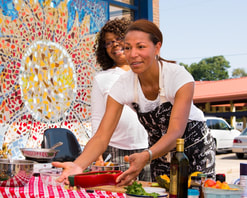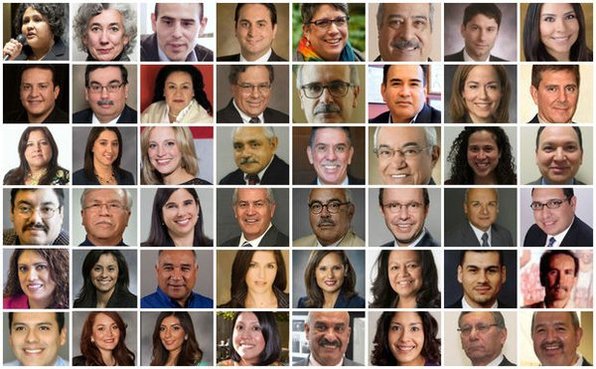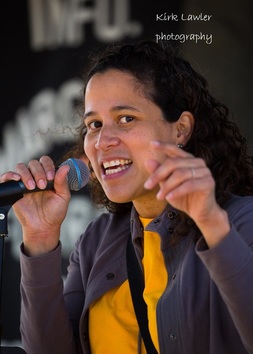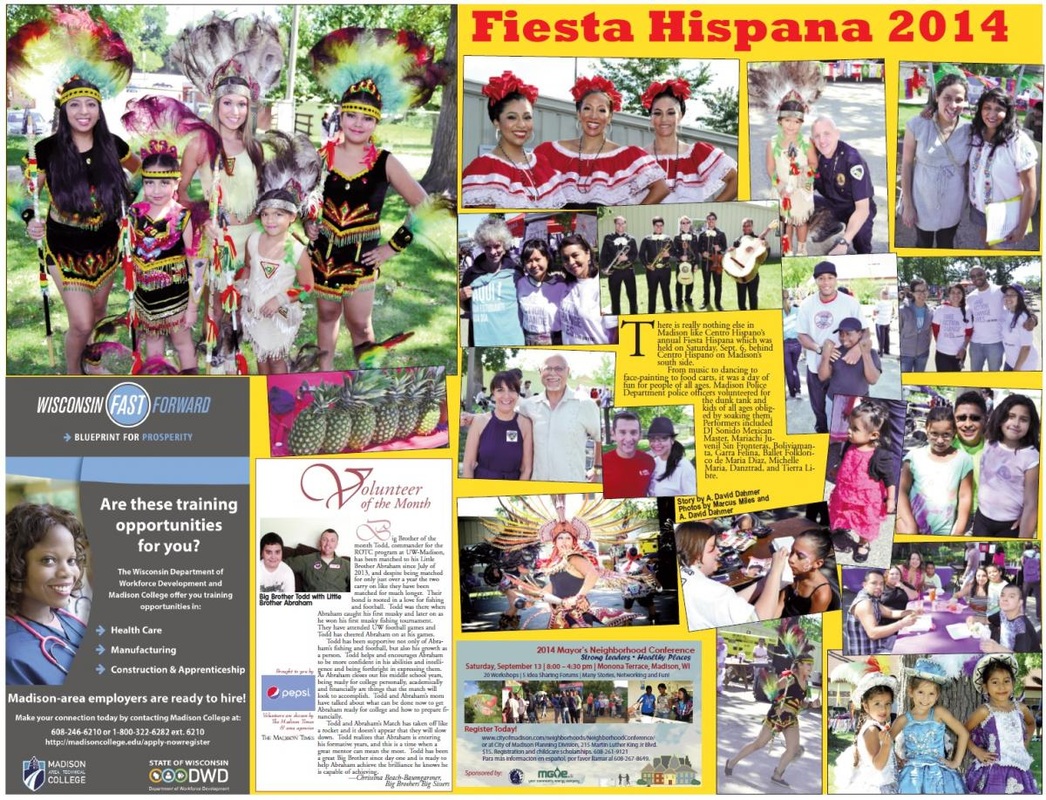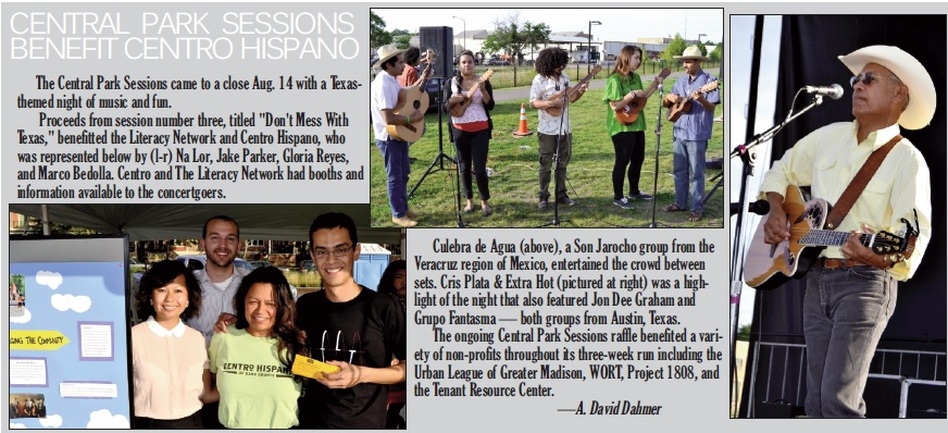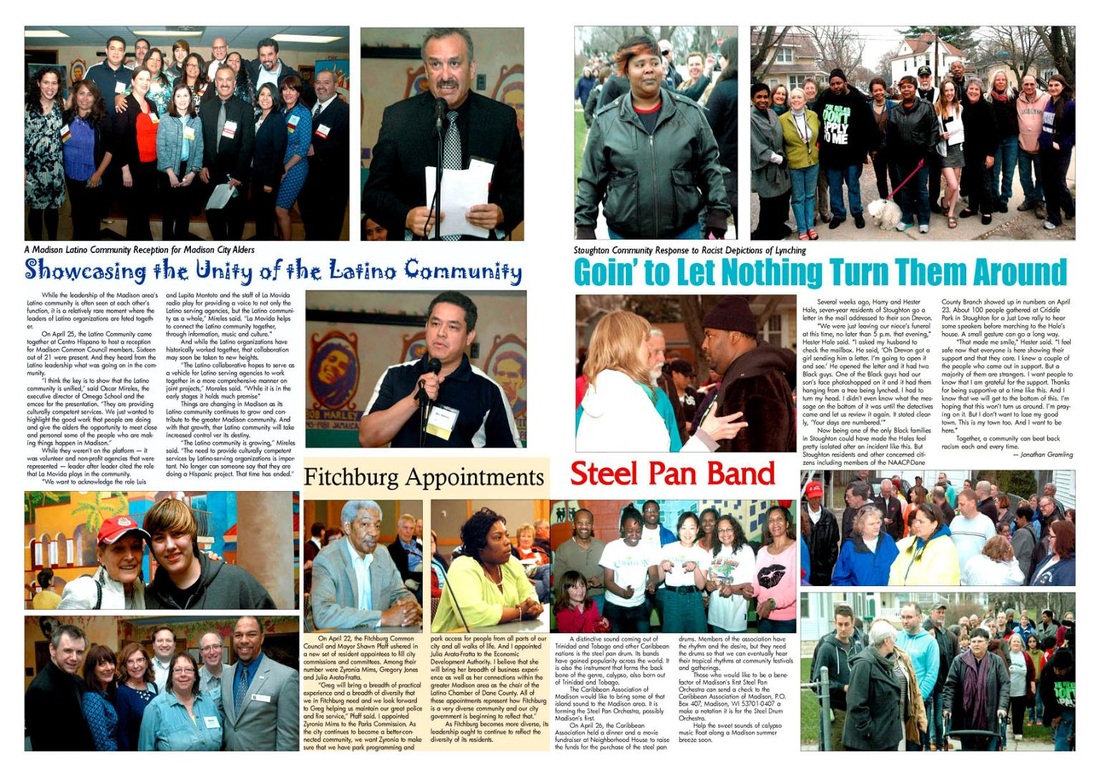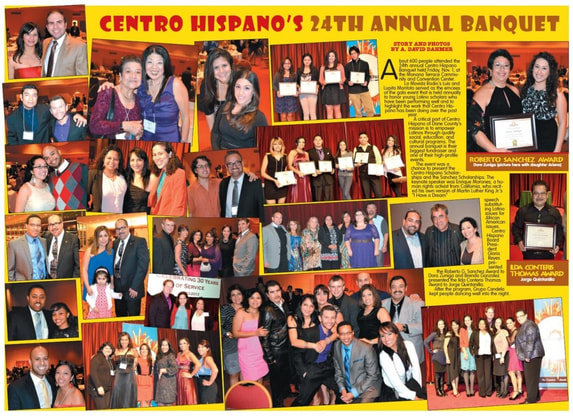CENTRO IN THE NEWS 2017
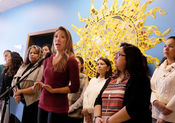
'A year of crisis': Madison's Latino community looks back on 2017
After a presidential campaign that included plenty of anti-immigrant rhetoric, some Madison Latinos were afraid and uncertain after Donald Trump took office last January. That was exacerbated by Trump’s decision to end the Deferred Action for Childhood Arrivals program. Adding to their worries: bills in the Wisconsin Legislature that would effectively ban so-called sanctuary cities...
-The Cap Times, December 29, 2017
After a presidential campaign that included plenty of anti-immigrant rhetoric, some Madison Latinos were afraid and uncertain after Donald Trump took office last January. That was exacerbated by Trump’s decision to end the Deferred Action for Childhood Arrivals program. Adding to their worries: bills in the Wisconsin Legislature that would effectively ban so-called sanctuary cities...
-The Cap Times, December 29, 2017
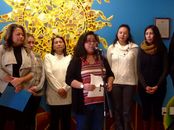
Madison students, community leaders urge comprehensive immigration reform
As Madison Mayor Paul Soglin and other Wisconsin leaders lobby in Washington, D.C. for Congress to pass the Dream Act of 2017, local students and leaders met at Centro Hispano Wednesday to advocate for comprehensive immigration reform.
Under an order from President Donald Trump Sept. 5, students like Alondra Quechol and Erika Rosales who are living, working and studying in the United States under the Deferred Action for Childhood Arrivals program will be eligible for deportation as early as March...
-Cap Times, December 7, 2017
As Madison Mayor Paul Soglin and other Wisconsin leaders lobby in Washington, D.C. for Congress to pass the Dream Act of 2017, local students and leaders met at Centro Hispano Wednesday to advocate for comprehensive immigration reform.
Under an order from President Donald Trump Sept. 5, students like Alondra Quechol and Erika Rosales who are living, working and studying in the United States under the Deferred Action for Childhood Arrivals program will be eligible for deportation as early as March...
-Cap Times, December 7, 2017
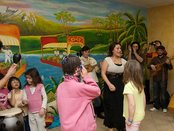
Taking back the walls of Centro Hispano
I am not an art critic. I am a multiracial, Latinx, racial justice educator committed to decolonizing my mind. Through these lenses, I am an activist here in Madison. From 2009 to 2010 I worked for Centro Hispano, the only Dane County organization serving predominately Latinos. During my short tenure at Centro I witnessed a lot of well-intentioned initiatives that were less grounded in the racial justice and decolonization imperative that is needed to liberate and elevate Latinx folks...
-Isthmus, November 16, 2017
I am not an art critic. I am a multiracial, Latinx, racial justice educator committed to decolonizing my mind. Through these lenses, I am an activist here in Madison. From 2009 to 2010 I worked for Centro Hispano, the only Dane County organization serving predominately Latinos. During my short tenure at Centro I witnessed a lot of well-intentioned initiatives that were less grounded in the racial justice and decolonization imperative that is needed to liberate and elevate Latinx folks...
-Isthmus, November 16, 2017
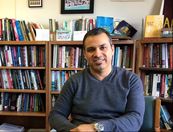
Armando Ibarra Wins Centro Hispano’s Prestigious Roberto G. Sánchez Award
“When [Executive Director] Karen [Menendez Coller] called me up from Centro Hispano to tell me that I was going to get the Sánchez Award, I was surprised. To me, an award from Centro Hispano is as important as an award from any leading academic association,” says Armando Ibarra. “I think that the work that Centro Hispano does is as important as any of the work that I do with any national association because they reach families. They reach youth...
-Madison 365, November 10, 2017
“When [Executive Director] Karen [Menendez Coller] called me up from Centro Hispano to tell me that I was going to get the Sánchez Award, I was surprised. To me, an award from Centro Hispano is as important as an award from any leading academic association,” says Armando Ibarra. “I think that the work that Centro Hispano does is as important as any of the work that I do with any national association because they reach families. They reach youth...
-Madison 365, November 10, 2017

What a difference design makes!
It’s the rare nonprofit that can call its offices and facilities palatial. Some are even lucky if they can use the words attractive, modern, or functional when describing their workspace. Like many nonprofits, Madison’s Centro Hispano has long eschewed cosmetic improvements to its offices so it can instead pour its resources into assisting the community it serves. It’s one of the reasons the charity was selected as this year’s Design for a Difference makeover sponsored by FLOOR360 of Madison, which has been providing these makeovers since 2015...
-InBusiness, October 2017
It’s the rare nonprofit that can call its offices and facilities palatial. Some are even lucky if they can use the words attractive, modern, or functional when describing their workspace. Like many nonprofits, Madison’s Centro Hispano has long eschewed cosmetic improvements to its offices so it can instead pour its resources into assisting the community it serves. It’s one of the reasons the charity was selected as this year’s Design for a Difference makeover sponsored by FLOOR360 of Madison, which has been providing these makeovers since 2015...
-InBusiness, October 2017

Centro Hispano reopens with a new look after being remodeled
MADISON (WKOW) -- Members of a local nonprofit got emotional Sunday as they got their first look at the inside of their new remodeled building. Centro Hispano was treated to a roughly $400,000 renovation, free of charge, by Floor360. 38 interior designers from Madison joined in to help give several rooms a facelift...
-WKOW, October 15, 2017
MADISON (WKOW) -- Members of a local nonprofit got emotional Sunday as they got their first look at the inside of their new remodeled building. Centro Hispano was treated to a roughly $400,000 renovation, free of charge, by Floor360. 38 interior designers from Madison joined in to help give several rooms a facelift...
-WKOW, October 15, 2017

Design for a Difference: Centro Hispano
MADISON, Wis. (WTMV) - Centro Hispano, a Madison area non-profit that provides services to Latino families, was awarded a $600,000 renovation from Madison area designers. Design for a Difference Madison is a local organization that raises money to renovate non profit spaces annually. It is run by the design company FLOOR360... -NBC15, October 15, 2017
MADISON, Wis. (WTMV) - Centro Hispano, a Madison area non-profit that provides services to Latino families, was awarded a $600,000 renovation from Madison area designers. Design for a Difference Madison is a local organization that raises money to renovate non profit spaces annually. It is run by the design company FLOOR360... -NBC15, October 15, 2017
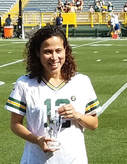
Packers present Karen Menéndez Coller with Hispanic Heritage Leadership Award
The Green Bay Packers will recognize Karen Menéndez Coller on Sunday at the Packers-Bengals game to honor her as the recipient of the annual NFL Hispanic Heritage Leadership Award. Prior to the game, Menéndez Coller will be recognized on the field and will receive the award. Menéndez Coller serves as Executive Director of Centro Hispano, a nonprofit organization in Dane County that provides social services, job training, educational opportunities and a cultural home to Latinos and other immigrant populations...
-Pakers News, September 24, 2017
The Green Bay Packers will recognize Karen Menéndez Coller on Sunday at the Packers-Bengals game to honor her as the recipient of the annual NFL Hispanic Heritage Leadership Award. Prior to the game, Menéndez Coller will be recognized on the field and will receive the award. Menéndez Coller serves as Executive Director of Centro Hispano, a nonprofit organization in Dane County that provides social services, job training, educational opportunities and a cultural home to Latinos and other immigrant populations...
-Pakers News, September 24, 2017

Packers honor Madison woman with Hispanic Heritage Leadership Award
The Green Bay Packers will recognize Karen Menéndez Coller on Sunday at the Packers-Bengals game as the recipient of the annual NFL Hispanic Heritage Leadership Award. Before the game, Menéndez Coller will be recognized on the field and will receive the award...
-NBC115, September 22, 2017
The Green Bay Packers will recognize Karen Menéndez Coller on Sunday at the Packers-Bengals game as the recipient of the annual NFL Hispanic Heritage Leadership Award. Before the game, Menéndez Coller will be recognized on the field and will receive the award...
-NBC115, September 22, 2017
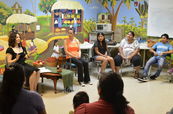
Trump's DACA announcement pushes Madison's Centro Hispano to expand fundraiser
Centro Hispano of Dane County planned its second annual “Evening of Dreaming” fall fundraiser as an art and food pop-up with a $40 price tag. But plans changed after President Donald Trump announced earlier this month that he would end the Deferred Action for Childhood Arrivals (DACA) program...
-The Cap Times, September 19, 2017
Centro Hispano of Dane County planned its second annual “Evening of Dreaming” fall fundraiser as an art and food pop-up with a $40 price tag. But plans changed after President Donald Trump announced earlier this month that he would end the Deferred Action for Childhood Arrivals (DACA) program...
-The Cap Times, September 19, 2017
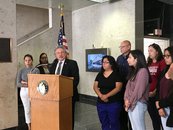
With future of DACA uncertain, Soglin stresses importance of local immigrant community
In an effort to stop President Donald Trump from terminating the Deferred Action of Childhood Arrivals program, Madison Mayor Paul Soglin joined cities across the country in defending the importance of the program. During the Mayors’ National DACA Day of Action, Soglin, in a news conference, addressed some of the economic misunderstandings about DACA recipients and the immigrant community...
-The Badger Herald, August 30, 2017
In an effort to stop President Donald Trump from terminating the Deferred Action of Childhood Arrivals program, Madison Mayor Paul Soglin joined cities across the country in defending the importance of the program. During the Mayors’ National DACA Day of Action, Soglin, in a news conference, addressed some of the economic misunderstandings about DACA recipients and the immigrant community...
-The Badger Herald, August 30, 2017
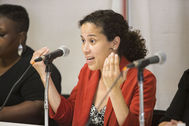
Dane County task force aims to build trust between law enforcement, immigrants
A new Dane County “Immigration and Refugee Task Force” aims to facilitate trust between local law enforcement officials and the immigrant and refugee communities, and it wants the media’s help to do it. The task force, announced last Friday at a press conference, is led by NAACP and United Way of Dane County and includes representatives from the Madison Metropolitan School District, Dane County Sheriff’s Office, Centro Hispano, City of Madison Police Department, African American Council of Churches, Urban League of Greater Madison and other community organizations...
-The Cap Times, June 23, 2017
A new Dane County “Immigration and Refugee Task Force” aims to facilitate trust between local law enforcement officials and the immigrant and refugee communities, and it wants the media’s help to do it. The task force, announced last Friday at a press conference, is led by NAACP and United Way of Dane County and includes representatives from the Madison Metropolitan School District, Dane County Sheriff’s Office, Centro Hispano, City of Madison Police Department, African American Council of Churches, Urban League of Greater Madison and other community organizations...
-The Cap Times, June 23, 2017
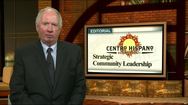
Centro Hispano is important, impactful asset in community
Centro Hispano of Dane County's leadership presented its annual strategic update Thursday and it continued to underscore the organization's position as one of the community's most important and impactful organizations and assets...
-Channel 3000, June 8, 2017
Centro Hispano of Dane County's leadership presented its annual strategic update Thursday and it continued to underscore the organization's position as one of the community's most important and impactful organizations and assets...
-Channel 3000, June 8, 2017

First Centro Hispano farmer's market of the summer is small but "not about the numbers" For the third year, Centro Hispano is hosting a farmer’s “mercadito” or “little market.” It’s well named, because the first one of the year was pretty petite. With just a handful of vendors, the first market of the season on Sunday afternoon brought a steady trickle of guests into the hot sun and high temperatures...
- The Cap Times, June 5, 2017
- The Cap Times, June 5, 2017
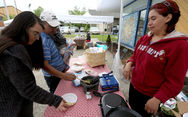
Centro Hispano expands farmers' markets with additional activities, wellness information
This year, the farmers' market at Centro Hispano is stepping up its game. Centro Hispano has been hosting farmers' markets for a while (including a winter market), but this year, the first market of every month will be amped up with activities to encourage community and provide a platform for health education.
- The Cap Times, June 2, 2017
This year, the farmers' market at Centro Hispano is stepping up its game. Centro Hispano has been hosting farmers' markets for a while (including a winter market), but this year, the first market of every month will be amped up with activities to encourage community and provide a platform for health education.
- The Cap Times, June 2, 2017
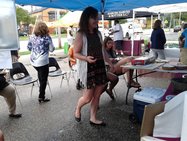
Centro Hispano's Mercadito About More Than Food
“The Latino population in southern Wisconsin has grown by more than 50% in the last ten years and the necessities of this population haven’t really been addressed, especially in the way they engage with the community,” said Marcos Lozano, manager of el Mercadito at Centro Hispano in Madison...
- Madison 365, June 2, 2017
“The Latino population in southern Wisconsin has grown by more than 50% in the last ten years and the necessities of this population haven’t really been addressed, especially in the way they engage with the community,” said Marcos Lozano, manager of el Mercadito at Centro Hispano in Madison...
- Madison 365, June 2, 2017
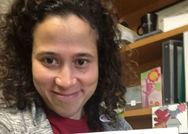
John Nichols: Honoring Nan Cheney and Karen Menendez Coller
When Nan Cheney passed away in 2010, The Capital Times recalled her decades of work on behalf of peace and economic and social justice. And we suggested that Madison should “honor Nan Cheney in lots of ways: by celebrating her life, planting flowers, rallying for peace and justice, and doing it all in warm good spirits.”...
-The Cap Times, May 22, 2017
When Nan Cheney passed away in 2010, The Capital Times recalled her decades of work on behalf of peace and economic and social justice. And we suggested that Madison should “honor Nan Cheney in lots of ways: by celebrating her life, planting flowers, rallying for peace and justice, and doing it all in warm good spirits.”...
-The Cap Times, May 22, 2017
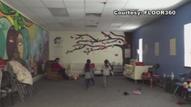
Design for a Difference renovates local nonprofits
Design for a Difference brings local business owners together with interior designers to makeover much needed spaces at local charities. This year's recipient is Centro Hispano. Angela Skalitzky from FLOOR360 and Design for a Difference joins NBC15's Amy Carlson to talk about Centro Hispano, as well as last year's renovation and how you can get involved...
-NBC15, May 6, 2017
Design for a Difference brings local business owners together with interior designers to makeover much needed spaces at local charities. This year's recipient is Centro Hispano. Angela Skalitzky from FLOOR360 and Design for a Difference joins NBC15's Amy Carlson to talk about Centro Hispano, as well as last year's renovation and how you can get involved...
-NBC15, May 6, 2017
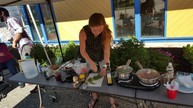
Announcing the 2017 Community Reinvestment Fund Grant Recipients
Centro Hispano ensures “Latino families can aspire upward, to reach their personal goals and dreams because they feel engaged and strengthened with the tools for success.” The Earth Made My Lunch is designed to accompany their adult-geared Let’s Get Healthy This Summer program related to food, nutrition, herbal medicine, and traditional food preparation...
- Willie Street Co-op, May 1, 2017
Centro Hispano ensures “Latino families can aspire upward, to reach their personal goals and dreams because they feel engaged and strengthened with the tools for success.” The Earth Made My Lunch is designed to accompany their adult-geared Let’s Get Healthy This Summer program related to food, nutrition, herbal medicine, and traditional food preparation...
- Willie Street Co-op, May 1, 2017

Centro Hispano Executive Director Earns First Nan Cheney Award from Forward Community Investments
Karen Menendez Coller, executive director of Madison’s Centro Hispano, has been named the inaugural recipient of Forward Community Investments (FCI) “March for Justice” Award made in memory of Nan Cheney, a passionate social justice activist. The current political climate has made things difficult for immigrant communities and organizations that serve these communities.
- Madison 365, April 5, 2017
Karen Menendez Coller, executive director of Madison’s Centro Hispano, has been named the inaugural recipient of Forward Community Investments (FCI) “March for Justice” Award made in memory of Nan Cheney, a passionate social justice activist. The current political climate has made things difficult for immigrant communities and organizations that serve these communities.
- Madison 365, April 5, 2017
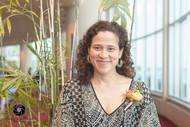
FEATURED VIDEO | DESIGN FOR A DIFFERENCE 2017 CHARITY
Learn Read about Centro Hispano and how excited they are to be the recipient of the 2017 charity makeover.
-BRAVA Magazine, April 1, 2017
Learn Read about Centro Hispano and how excited they are to be the recipient of the 2017 charity makeover.
-BRAVA Magazine, April 1, 2017

Dr. Karen Menéndez Coller Interviewed on For The Record Regarding Nan Cheney March For Justice Award (interview starts at 10:40 mark)
Join Forward Community Investments to pay tribute to Dr. Karen Menendez Coller and her work at Centro Hispano of Dane County. It's the kind of work so desperately needed in these times of fear and division. It's the kind of work befitting Karen receiving the first ever $15,000 Nan Cheney March for Justice Award. It's the kind of work that inspires us to fearlessly use our money, time and resources to end racial disparities and injustices...
- For The Record, April 2017
Join Forward Community Investments to pay tribute to Dr. Karen Menendez Coller and her work at Centro Hispano of Dane County. It's the kind of work so desperately needed in these times of fear and division. It's the kind of work befitting Karen receiving the first ever $15,000 Nan Cheney March for Justice Award. It's the kind of work that inspires us to fearlessly use our money, time and resources to end racial disparities and injustices...
- For The Record, April 2017
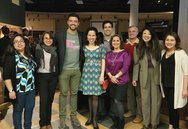
Design for a Difference Chooses Centro Hispano for Total Interior Makeover
Centro Hispano is getting a total interior makeover of its building on Madison’s south side. That was the big news that came out of the Spring into Design kickoff event last night at Floor360 in Verona...
- Madison365, March 24, 2017
Centro Hispano is getting a total interior makeover of its building on Madison’s south side. That was the big news that came out of the Spring into Design kickoff event last night at Floor360 in Verona...
- Madison365, March 24, 2017
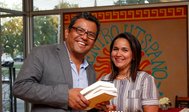
Mario Garcia Sierra Elected New Board President for Centro Hispano
Mario Garcia Sierra has been elected president of the board of directors for Centro Hispano of Dane County. Centro Hispano is focused on improving the quality of life for Latinos in Dane County by empowering youth, strengthening families, and engaging the community. “I’m looking forward to my new journey with Centro Hispano,” Garcia Sierra tells Madison365...
- Madison 365, March 15, 2017
Mario Garcia Sierra has been elected president of the board of directors for Centro Hispano of Dane County. Centro Hispano is focused on improving the quality of life for Latinos in Dane County by empowering youth, strengthening families, and engaging the community. “I’m looking forward to my new journey with Centro Hispano,” Garcia Sierra tells Madison365...
- Madison 365, March 15, 2017

Credit unions’ jobs program builds bridges - Effort ‘opens new doors’ for the local Latino community
Four Madison, Wis.-area credit unions are offering career opportunities for Latinos through a local job-building program, demonstrating what community stakeholders can accomplish when they share their resources and expertise...
- Credit Union Insight, March 8, 2017
Four Madison, Wis.-area credit unions are offering career opportunities for Latinos through a local job-building program, demonstrating what community stakeholders can accomplish when they share their resources and expertise...
- Credit Union Insight, March 8, 2017

Today’s Centro Hispano “El Mercadito” Will Have International Women’s Day Feel
Centro Hispano will be hosting its weekly winters farmers’ market – El Mercadito – this afternoon from 3-6 p.m. with International Women’s Day in mind. “All of our vendors at El Mercadito are smart entrepreneurial women who have been working hard to keep bringing healthy and sustainable food to our tables,” says Marcos Lozano, Centro Hispano Farmers’ Market Manager...
- Madison365, March 8, 2017
Centro Hispano will be hosting its weekly winters farmers’ market – El Mercadito – this afternoon from 3-6 p.m. with International Women’s Day in mind. “All of our vendors at El Mercadito are smart entrepreneurial women who have been working hard to keep bringing healthy and sustainable food to our tables,” says Marcos Lozano, Centro Hispano Farmers’ Market Manager...
- Madison365, March 8, 2017
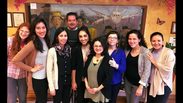
Fear, anxiety, resistance, hope: Latinos set for battle in Trump era
President Donald Trump’s victory in November – and inauguration as our 45th president last month – was a transformative event for Latinos, the United States’ largest minority group. And not in a good way...
- Channel3000, February 27, 2017
President Donald Trump’s victory in November – and inauguration as our 45th president last month – was a transformative event for Latinos, the United States’ largest minority group. And not in a good way...
- Channel3000, February 27, 2017
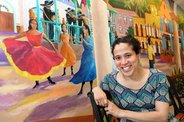
Karen Menéndez Coller: If you believe in the Latinos' fight, the time is NOW
These last few months I have questioned my identity. Despite frustrations, I had never before doubted my place in America. But last fall I started to. And so I did what grounds me more than anything and made the most sense at this time: I took a short break from Centro Hispano, where I have been executive director for the past three years, to regain my perspective... - Madison Cap Times, Feb. 20, 2017
These last few months I have questioned my identity. Despite frustrations, I had never before doubted my place in America. But last fall I started to. And so I did what grounds me more than anything and made the most sense at this time: I took a short break from Centro Hispano, where I have been executive director for the past three years, to regain my perspective... - Madison Cap Times, Feb. 20, 2017
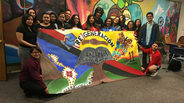
Latinx students find support at Centro Hispano
MADISON, Wis. - Undocumented students in Madison discussed fear at a weekly Latinx youth meeting Wednesday. After hearing about Daniel Ramirez Medina, a 23-year-old undocumented Seattle man who was detained by ICE last week, students said they felt on edge...
- Channel3000, February 15, 2017
MADISON, Wis. - Undocumented students in Madison discussed fear at a weekly Latinx youth meeting Wednesday. After hearing about Daniel Ramirez Medina, a 23-year-old undocumented Seattle man who was detained by ICE last week, students said they felt on edge...
- Channel3000, February 15, 2017

Second 'Day Without Latinos' set for Monday in Milwaukee
Salvador Rojas and his wife Rafaela Flores came to America in 2001 to flee violence in their hometown. They settled in Milwaukee. Although he has no criminal record, Rojas spent about eight years going through the deportation process before being granted a new visa. Ever since then, the couple's son has been afraid the family might be deported, they said through a translator...
- Madison Cap Times, February 7, 2017
Salvador Rojas and his wife Rafaela Flores came to America in 2001 to flee violence in their hometown. They settled in Milwaukee. Although he has no criminal record, Rojas spent about eight years going through the deportation process before being granted a new visa. Ever since then, the couple's son has been afraid the family might be deported, they said through a translator...
- Madison Cap Times, February 7, 2017

Centro Hispano's celebracion de Día de los Tres Reyes Magos: A fun-filled family tradition
Just when it seems that the winter blues are starting to set in after the Christmas holidays, it seems that Dia de los Tres Reyes Magos gives the Latino Community a shot of good will and joy during those short winter days...
- Capital City Hues, Feb. 2, 2017
Just when it seems that the winter blues are starting to set in after the Christmas holidays, it seems that Dia de los Tres Reyes Magos gives the Latino Community a shot of good will and joy during those short winter days...
- Capital City Hues, Feb. 2, 2017
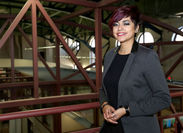
'We certainly are afraid': Undocumented children of immigrants hope Trump won’t erase recent gains
Laura Minero learned multiplication from the back of a Ritz cracker box when she was in first grade. “My mom wrote the times tables out by hand, 1 through 9, so I could learn them,” Minero said. With just a sixth-grade education, Minero’s mother was motivated to not just teach her daughter math, but also bring her along as she illegally entered the United States from Mexico to rejoin her husband.
- Madison Cap Times, February 1, 2017
Laura Minero learned multiplication from the back of a Ritz cracker box when she was in first grade. “My mom wrote the times tables out by hand, 1 through 9, so I could learn them,” Minero said. With just a sixth-grade education, Minero’s mother was motivated to not just teach her daughter math, but also bring her along as she illegally entered the United States from Mexico to rejoin her husband.
- Madison Cap Times, February 1, 2017
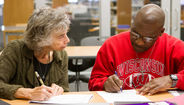
HIRE initiative to host event to connect local employers with underemployed job seekers
A Friday event aims to let employers looking for qualified candidates know they have a local resource: the HIRE Initiative. HIRE (which is not an acronym) was launched by United Way of Dane County, and looks to bridge the gap between underemployed people looking for jobs and companies looking for people...
- Madison Cap Times, January 27, 2017
A Friday event aims to let employers looking for qualified candidates know they have a local resource: the HIRE Initiative. HIRE (which is not an acronym) was launched by United Way of Dane County, and looks to bridge the gap between underemployed people looking for jobs and companies looking for people...
- Madison Cap Times, January 27, 2017
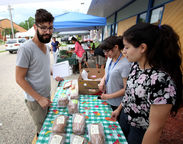
Centro Hispano expands wellness program to fight food insecurity, grow leadership
While many in Madison see the Latino community as a uniform population, Karen Menéndez Coller, the executive director of Centro Hispano, knows that’s far from the truth. There are many different classifications of “Latino” based on country of origin or how recently an individual immigrated...
- Madison Cap Time, January 17, 2017
While many in Madison see the Latino community as a uniform population, Karen Menéndez Coller, the executive director of Centro Hispano, knows that’s far from the truth. There are many different classifications of “Latino” based on country of origin or how recently an individual immigrated...
- Madison Cap Time, January 17, 2017
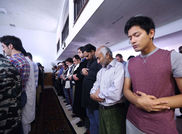
Citywide forum to provide information for those facing possible 'deportation or discrimination'
Members of minority communities in Madison are living with both fear and hope as President-elect Donald Trump prepares to take office this week, said Masood Akhtar, a prominent member of the area’s Muslim community. The fear is over the uncertainty of what lies ahead given statements Trump has made on immigration, the possibility a Muslim registry and other topics, Akhtar said...
- Madison Cap Times, January 15, 2017
Members of minority communities in Madison are living with both fear and hope as President-elect Donald Trump prepares to take office this week, said Masood Akhtar, a prominent member of the area’s Muslim community. The fear is over the uncertainty of what lies ahead given statements Trump has made on immigration, the possibility a Muslim registry and other topics, Akhtar said...
- Madison Cap Times, January 15, 2017

El Dia De Los Trey Reyes (Three Kings Day) 2017
Once again, children will be forming a line to sit on the laps and get a regalo from Melchor, Gaspar, and Baltasar at Centro Hispano’s annual Tres Reyes Magos (Three Kings’ Day) celebration Jan. 13, 4-6 p.m. at Centro...
- Madison365, January 4, 2017
Once again, children will be forming a line to sit on the laps and get a regalo from Melchor, Gaspar, and Baltasar at Centro Hispano’s annual Tres Reyes Magos (Three Kings’ Day) celebration Jan. 13, 4-6 p.m. at Centro...
- Madison365, January 4, 2017
2016 AND BEFORE PRESS
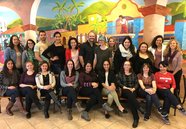
27th Annual Centro Hispano Banquet Will Be A Time To DREAM
There’s no denying that Centro Hispano of Dane County’s profile is continuing to rise in the city of Madison and beyond. Centro is no longer the obscure agency tucked away on Badger Road on Madison’s south side. The success of its programs and the community partnerships they have formed are starting to get some buzz in the broader community...
- Madison365, November 2, 2016
There’s no denying that Centro Hispano of Dane County’s profile is continuing to rise in the city of Madison and beyond. Centro is no longer the obscure agency tucked away on Badger Road on Madison’s south side. The success of its programs and the community partnerships they have formed are starting to get some buzz in the broader community...
- Madison365, November 2, 2016

Dane County Latino leaders issue call to action. -Wisconsin State Journal, September 16, 2016
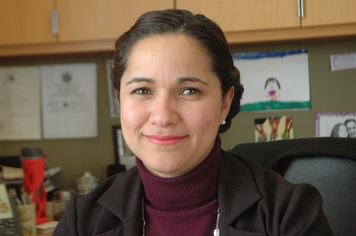
MADISON365
Q& A: Sujhey Beisser
Centro Hispano of Dane County Board President
Latinos in the Madison community are doing tremendous things without even realizing how large of an impact they’re making on others.
Extending a hand to those who need it most is what Centro Hispano has been doing for quite some time and Sujhey Beisser has been helping to lead the way as the president of the Centro Hispano’s board of directors. Centro works to improve the quality of life for Latinos and others living in Dane County by empowering youth, strengthening families, and engaging the community.
Centro Hispano’s story is rooted in the simplicity of genuine care and awareness for those that are not as fortunate. Over the years the Latino community in Dane County has grown and along with it, Centro Hispano’s programs and services have expanded. Today, Centro Hispano’s largest programs are those that serve Latino youth in Dane County schools.
Born and raised in Venezuela, Beisser has been in Madison since 2001. I chatted with her about a variety of topics including Centro Hispano. It was immediately evident the level of sincerity she and her Centro counterparts have towards helping adults and the youth to excel and for providing a safe haven for expression and comfort for the Latino community here in Dane County.
Madison365: What specifically do you do?
Sujhey Beisser: I have been with Park Bank for 14 years. I am currently a branch manager at the Sun Prairie location. I started as a customer service banker at the Old Sauk branch and held the personal banker and assistant manager roles before being promoted into my current position in 2013. That’s my day job.
I also serve on the board of directors of Centro Hispano, where I am currently the president. I’ve been working with Centro since 2008 because I believe in its mission, the community it serves, its potential, and the staff that works tirelessly to keep the agency moving forward. In my spare time, I do what I enjoy the most: cooking, photographing, and sharing recipes and other food adventures in my food blog Five Senses Palate. That is a project that started as a place to use some of my inner creativity, as well as keep all my favorite recipes in one place to share with friends and family. I like where this project has taken me, pushing me in many ways to be better at different things, but most of all at finding a balance between family, work, community and my passion for cooking.
Sujhey Beisser is an avid cook and she talks about her food adventures in my food blog Five Senses Palate.
Madison365: Where do you get most of your ideas/inspiration?
Sujhey Beisser: It depends on what I am working on. My family is a great inspiration in all areas of my life. When it comes to business and community-related matters, I always turn to my peers for advice, and guidance. I want to do what works, so if something is already working for someone else, there is no need to reinvent the wheel. I love to brainstorm with colleagues and bounce ideas off of each other. When it comes to cooking, I get a lot of ideas and inspiration from cookbooks, magazines, and food from restaurants I like. I develop serious crushes on chefs around the globe and their food. I get obsessed with trying to make their food in my own kitchen.
Madison365: What is your favorite place for thinking?
Sujhey Beisser: Anywhere around natural beauty. It could be by the water, a nice clear starry sky, trees covered in snow, sunsets or sunrises, the moon, or the mountains. I feel most inspired when I am around nature. Realistically, I just go down stairs to my little home office to do my writing and lots of thinking. I do meditation in that room, too. This happens most often very early in the morning while my husband and kids are still asleep.
Madison365: Who/what inspires you?
Sujhey Beisser: People that are passionate about what they do inspire me. People that give without expecting to receive anything in return inspire me. People that want to motivate other people, and try to make the world a better place, even if it’s just a little bit at a time, inspire me. I don’t want to be like anyone else when I grow up, I just want to learn as much as I can from all those people and be myself. If along the way I could inspire others, then I would be living a meaningful life. I am very thankful to the great mentors that have inspired me and helped me grow over the years; many of them are members of this community. I’d love to pass that knowledge on to others and pay it forward.
Madison365: As an important Latino personality in Madison, how do you hope to help the Latino community in Wisconsin?
Sujhey Beisser: I don’t know about important, I am just another member of this community trying to make a difference. There are many of us trying to push for the same changes to happen. The truth is that the Latino population has only been increasing in Wisconsin for the past two decades. Latinos are here to stay and we need to focus on providing them with the right tools for success. The growth of the Latino community is tremendously important for the economy in Wisconsin; it would be a mistake for our government not to realize this.
I couldn’t possibly take credit for the amazing work that the Centro staff and volunteers do to provide support to our Latino community. What I hope is that my guidance and leadership, along with the rest of our incredible board members, would help to create a stronger community with thriving families and healthy neighborhoods. We hope that Centro can be that place where everyone feels welcome, where they feel like family, where they belong, and where there will always be a hand to count on. I feel extremely lucky to be able to work alongside [Centro Executive Director] Dr. Karen Menendez-Coller, pushing to get the agency to the next level. She is an amazing leader that inspires me and many others in this community. The hope is that we can engage the community, supporters, advocates, and volunteers and continue to push to have a lasting positive impact.
Written by Francisco Velazquez
Madison 365
Q& A: Sujhey Beisser
Centro Hispano of Dane County Board President
Latinos in the Madison community are doing tremendous things without even realizing how large of an impact they’re making on others.
Extending a hand to those who need it most is what Centro Hispano has been doing for quite some time and Sujhey Beisser has been helping to lead the way as the president of the Centro Hispano’s board of directors. Centro works to improve the quality of life for Latinos and others living in Dane County by empowering youth, strengthening families, and engaging the community.
Centro Hispano’s story is rooted in the simplicity of genuine care and awareness for those that are not as fortunate. Over the years the Latino community in Dane County has grown and along with it, Centro Hispano’s programs and services have expanded. Today, Centro Hispano’s largest programs are those that serve Latino youth in Dane County schools.
Born and raised in Venezuela, Beisser has been in Madison since 2001. I chatted with her about a variety of topics including Centro Hispano. It was immediately evident the level of sincerity she and her Centro counterparts have towards helping adults and the youth to excel and for providing a safe haven for expression and comfort for the Latino community here in Dane County.
Madison365: What specifically do you do?
Sujhey Beisser: I have been with Park Bank for 14 years. I am currently a branch manager at the Sun Prairie location. I started as a customer service banker at the Old Sauk branch and held the personal banker and assistant manager roles before being promoted into my current position in 2013. That’s my day job.
I also serve on the board of directors of Centro Hispano, where I am currently the president. I’ve been working with Centro since 2008 because I believe in its mission, the community it serves, its potential, and the staff that works tirelessly to keep the agency moving forward. In my spare time, I do what I enjoy the most: cooking, photographing, and sharing recipes and other food adventures in my food blog Five Senses Palate. That is a project that started as a place to use some of my inner creativity, as well as keep all my favorite recipes in one place to share with friends and family. I like where this project has taken me, pushing me in many ways to be better at different things, but most of all at finding a balance between family, work, community and my passion for cooking.
Sujhey Beisser is an avid cook and she talks about her food adventures in my food blog Five Senses Palate.
Madison365: Where do you get most of your ideas/inspiration?
Sujhey Beisser: It depends on what I am working on. My family is a great inspiration in all areas of my life. When it comes to business and community-related matters, I always turn to my peers for advice, and guidance. I want to do what works, so if something is already working for someone else, there is no need to reinvent the wheel. I love to brainstorm with colleagues and bounce ideas off of each other. When it comes to cooking, I get a lot of ideas and inspiration from cookbooks, magazines, and food from restaurants I like. I develop serious crushes on chefs around the globe and their food. I get obsessed with trying to make their food in my own kitchen.
Madison365: What is your favorite place for thinking?
Sujhey Beisser: Anywhere around natural beauty. It could be by the water, a nice clear starry sky, trees covered in snow, sunsets or sunrises, the moon, or the mountains. I feel most inspired when I am around nature. Realistically, I just go down stairs to my little home office to do my writing and lots of thinking. I do meditation in that room, too. This happens most often very early in the morning while my husband and kids are still asleep.
Madison365: Who/what inspires you?
Sujhey Beisser: People that are passionate about what they do inspire me. People that give without expecting to receive anything in return inspire me. People that want to motivate other people, and try to make the world a better place, even if it’s just a little bit at a time, inspire me. I don’t want to be like anyone else when I grow up, I just want to learn as much as I can from all those people and be myself. If along the way I could inspire others, then I would be living a meaningful life. I am very thankful to the great mentors that have inspired me and helped me grow over the years; many of them are members of this community. I’d love to pass that knowledge on to others and pay it forward.
Madison365: As an important Latino personality in Madison, how do you hope to help the Latino community in Wisconsin?
Sujhey Beisser: I don’t know about important, I am just another member of this community trying to make a difference. There are many of us trying to push for the same changes to happen. The truth is that the Latino population has only been increasing in Wisconsin for the past two decades. Latinos are here to stay and we need to focus on providing them with the right tools for success. The growth of the Latino community is tremendously important for the economy in Wisconsin; it would be a mistake for our government not to realize this.
I couldn’t possibly take credit for the amazing work that the Centro staff and volunteers do to provide support to our Latino community. What I hope is that my guidance and leadership, along with the rest of our incredible board members, would help to create a stronger community with thriving families and healthy neighborhoods. We hope that Centro can be that place where everyone feels welcome, where they feel like family, where they belong, and where there will always be a hand to count on. I feel extremely lucky to be able to work alongside [Centro Executive Director] Dr. Karen Menendez-Coller, pushing to get the agency to the next level. She is an amazing leader that inspires me and many others in this community. The hope is that we can engage the community, supporters, advocates, and volunteers and continue to push to have a lasting positive impact.
Written by Francisco Velazquez
Madison 365
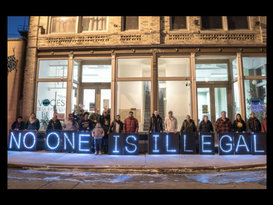
"Dia Sin Latinos" draws Wisconsin Latinos to Madison
Written on 365 Madison by David Dahmer . Photography: Overpass Light Brigade
Feb. 18th 2016
Madison will be pondering that today as thousands of Wisconsin Latinos will be leaving school, work and businesses to come to the state Capitol building to protest two pieces of anti-immigration legislation that the Wisconsin State Legislature is trying to push through. Several area businesses will be closed today for "Día Sin Latinos (Day Without Latinos)" to demonstrate what the community would be like without Latinos and immigrants.
"If all the Latinos that were working in Dane County were to walk out, it would be huge – especially here on the south side and on Park Street," Centro Hispano Executive Director Karen Menendez Coller tells Madison365. "So many of the employees that are hired by local businesses are Latino, so services would drop in so many ways. We are such a growing population here that consumerism would be affected. If the kids walk out, you will definitely see it at the schools. It will be a large void that is felt."
Centro Hispano works to improve the quality of life for Latinos and others living in Dane County by empowering youth, strengthening families and engaging the community. Recently, Centro has been ground zero for people coming together to network and to organize.
"A little while back, Christine Neumann-Ortiz, executive director of Voces de la Frontera, had an interest in creating a Voces chapter here in Madison," Menendez Coller says. "That was something where we could see a gap, and we thought was necessary for what we do. We needed to have a coordinating force."
Based out of Milwaukee, Voces de la Frontera is Wisconsin's leading grassroots immigrant rights group. They have been working with Centro to create a space in Madison where important discussions can happen. This past Saturday, Centro was host to over 300 people who gathered to talk about plans for the day of action on Thursday. "It's exciting because I feel for the first time I'm seeing families take ownership of these issues," Menendez Coller says. "They've had enough, and they are just going to do something about it."
There are two anti-immigration bills going through the Wisconsin State Legislature that are helping to energize the movement. The first bill prohibits towns and counties from issuing or expending funds for the issuance of a photo identification card for any resident of the town or county other than an employment-related identification card for employees of the town or county. The second bill prohibits "sanctuary cities" and bars local governments from adopting ordinances that prevent police or other local officials from asking crime suspects about immigration status.
Menendez Coller does not understand where the rush of legislation is coming from or why it is suddenly needed.
"Day-to-day, I see families. I see people working two or three jobs to give their children a better life. The exclusion is hard for me to watch," she says. "The two things that promote equity – employment and education – well, we won't give you a driver's license so you can't drive to any type of work and the kids can't go to college because we're not going to allow them to do that. It's just an unwelcoming feeling, and it affects so many in our community. It sends a message that we just don't see these individuals as equals. We can't treat them the same.
"They don't understand. People don't know the numbers, they don't know the background in those communities, they don't know the issues that are involved," she adds. "There is a big fear that has been created and unfortunately it's been simplified to criminals equal Latinos or danger equals immigrants."
According to a recent University of Wisconsin-Madison study, immigrants account for more than 40 percent of the hired help on dairy farms. They make up a big part of Madison-area businesses including construction, hotel, manufacturing, restaurants and grocery stores. Many of these Madison-area businesses will be closed today including several of the Latino Chamber of Commerce of Dane County's member businesses.
"The Latino Chamber of Commerce of Dane County is opposed to these anti-immigrant bills as they would significantly impact our local economy," says LCC President Mayra Medrano. "Latinos make a significant contribution to our community and are very involved in entrepreneurship here. We want to support them.
"Latinos and immigrant workers contribute to the Wisconsin economy on a daily basis," she adds. "Latinos and immigrants live in Wisconsin and in this country, because they too want to be part of the American Dream."
Organizers of "A Day without Latinos and Immigrants" called for people to assemble at the at the State Street entrance of the state Capitol at 10 a.m today. High school students in Madison and other cities are planning to walk out of class and march or board buses to the Capitol. Buses will be leaving from Centro on Madison's south side to go up to the Capitol.
"I hope that there will be a lot of people who aren't Latino at the rally today – white people, African American [people]," Menendez Coller says. "I hope that there will be a huge number of Latinos, but I also hope that this is the first step in the entire city seeing this as something that we need to rally around and that this is not just something that is our issue, but affects the whole community."
Written on 365 Madison by David Dahmer . Photography: Overpass Light Brigade
Feb. 18th 2016
Madison will be pondering that today as thousands of Wisconsin Latinos will be leaving school, work and businesses to come to the state Capitol building to protest two pieces of anti-immigration legislation that the Wisconsin State Legislature is trying to push through. Several area businesses will be closed today for "Día Sin Latinos (Day Without Latinos)" to demonstrate what the community would be like without Latinos and immigrants.
"If all the Latinos that were working in Dane County were to walk out, it would be huge – especially here on the south side and on Park Street," Centro Hispano Executive Director Karen Menendez Coller tells Madison365. "So many of the employees that are hired by local businesses are Latino, so services would drop in so many ways. We are such a growing population here that consumerism would be affected. If the kids walk out, you will definitely see it at the schools. It will be a large void that is felt."
Centro Hispano works to improve the quality of life for Latinos and others living in Dane County by empowering youth, strengthening families and engaging the community. Recently, Centro has been ground zero for people coming together to network and to organize.
"A little while back, Christine Neumann-Ortiz, executive director of Voces de la Frontera, had an interest in creating a Voces chapter here in Madison," Menendez Coller says. "That was something where we could see a gap, and we thought was necessary for what we do. We needed to have a coordinating force."
Based out of Milwaukee, Voces de la Frontera is Wisconsin's leading grassroots immigrant rights group. They have been working with Centro to create a space in Madison where important discussions can happen. This past Saturday, Centro was host to over 300 people who gathered to talk about plans for the day of action on Thursday. "It's exciting because I feel for the first time I'm seeing families take ownership of these issues," Menendez Coller says. "They've had enough, and they are just going to do something about it."
There are two anti-immigration bills going through the Wisconsin State Legislature that are helping to energize the movement. The first bill prohibits towns and counties from issuing or expending funds for the issuance of a photo identification card for any resident of the town or county other than an employment-related identification card for employees of the town or county. The second bill prohibits "sanctuary cities" and bars local governments from adopting ordinances that prevent police or other local officials from asking crime suspects about immigration status.
Menendez Coller does not understand where the rush of legislation is coming from or why it is suddenly needed.
"Day-to-day, I see families. I see people working two or three jobs to give their children a better life. The exclusion is hard for me to watch," she says. "The two things that promote equity – employment and education – well, we won't give you a driver's license so you can't drive to any type of work and the kids can't go to college because we're not going to allow them to do that. It's just an unwelcoming feeling, and it affects so many in our community. It sends a message that we just don't see these individuals as equals. We can't treat them the same.
"They don't understand. People don't know the numbers, they don't know the background in those communities, they don't know the issues that are involved," she adds. "There is a big fear that has been created and unfortunately it's been simplified to criminals equal Latinos or danger equals immigrants."
According to a recent University of Wisconsin-Madison study, immigrants account for more than 40 percent of the hired help on dairy farms. They make up a big part of Madison-area businesses including construction, hotel, manufacturing, restaurants and grocery stores. Many of these Madison-area businesses will be closed today including several of the Latino Chamber of Commerce of Dane County's member businesses.
"The Latino Chamber of Commerce of Dane County is opposed to these anti-immigrant bills as they would significantly impact our local economy," says LCC President Mayra Medrano. "Latinos make a significant contribution to our community and are very involved in entrepreneurship here. We want to support them.
"Latinos and immigrant workers contribute to the Wisconsin economy on a daily basis," she adds. "Latinos and immigrants live in Wisconsin and in this country, because they too want to be part of the American Dream."
Organizers of "A Day without Latinos and Immigrants" called for people to assemble at the at the State Street entrance of the state Capitol at 10 a.m today. High school students in Madison and other cities are planning to walk out of class and march or board buses to the Capitol. Buses will be leaving from Centro on Madison's south side to go up to the Capitol.
"I hope that there will be a lot of people who aren't Latino at the rally today – white people, African American [people]," Menendez Coller says. "I hope that there will be a huge number of Latinos, but I also hope that this is the first step in the entire city seeing this as something that we need to rally around and that this is not just something that is our issue, but affects the whole community."
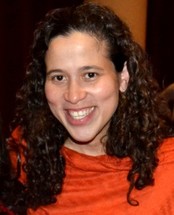
What Are We Doing To Support Latinos In Madison?
Written on 365 Madison by Karen M. Coller (Centro Hispano Executive Director)
Jan. 8th 2016
The questions come up all too often: How many undocumented persons are in Madison? How many undocumented clients does Centro Hispano serve? Were you documented when you came to this country?
When speaking of Latinos, we are overly fixated on legal status. It is true that being undocumented leaves you in the shadows without access to basic rights and strips you of your dignity as a human being. But even despite documentation, our health and well-being continue to worsen the longer we are here in this country.
Over time we are burdened by the struggles of fitting in, being accepted, being respected, not considered in decision-making, or being engaged in civic life. Our lives become overwhelmed with the chronic stress of life in communities where no matter how long you have lived there, the word “immigrant” can be followed by judgment. Being undocumented significantly affects our lives; but it only represents a part of our struggle
I often reflect on why I speak out for the rights of our Latino community. I was born in El Salvador and didn’t really establish roots in this country until I was a teenager. After living here for close to 30 years, this has become my home country. It is an injustice to deny that identity to me or to so many others who came here searching for stability, freedom and a future that politics in our countries of origin stole from us.
We deserve to feel comfortable here. As a Latina, I represent the fastest-growing minority group in Madison, Dane County and Wisconsin. We are the second-largest ethnic group behind non-Hispanic Whites in this country. We are much of the labor force driving the economy, as well as the millennials generating new initiatives and innovative ideas across many cities. Why are our rights something we have to fight for so vehemently? Why is this country so afraid of differences, and why do we continue to put people into buckets that divide us and lessen our “American-ness”?
We are not “aliens” or “illegals.” Nor are we dangerous. Words matter, so choose them wisely. We are human beings, striving for the best life possible, just like everyone else. Decades of civil war and community unrest have torn apart our dreams in our home countries. Like all people, we are not perfect, but it is unjust to expect us to be more perfect than anyone else, especially given the barriers we seek to overcome.
How many undocumented persons are in Madison? That is the wrong question. Ask instead: What we are doing to support Latinos in Madison?
In 2016, let us be reflective, ask the right questions and recognize that the current anti-immigrant policy rhetoric is wrong. Building walls, promoting blind deportations, and discriminatively closing borders is unnecessary and immoral. It is unjust, and it takes our country backwards. Immigrant children deserve the best education and the chance to aspire to reach dreams set forth by their families — so many of whom have sacrificed everything to be here. We need to create a system that will empower our Latino community, driven by a commitment from businesses, non-profits and the community-at-large.
If we don’t, as a country we will falter.
Written on 365 Madison by Karen M. Coller (Centro Hispano Executive Director)
Jan. 8th 2016
The questions come up all too often: How many undocumented persons are in Madison? How many undocumented clients does Centro Hispano serve? Were you documented when you came to this country?
When speaking of Latinos, we are overly fixated on legal status. It is true that being undocumented leaves you in the shadows without access to basic rights and strips you of your dignity as a human being. But even despite documentation, our health and well-being continue to worsen the longer we are here in this country.
Over time we are burdened by the struggles of fitting in, being accepted, being respected, not considered in decision-making, or being engaged in civic life. Our lives become overwhelmed with the chronic stress of life in communities where no matter how long you have lived there, the word “immigrant” can be followed by judgment. Being undocumented significantly affects our lives; but it only represents a part of our struggle
I often reflect on why I speak out for the rights of our Latino community. I was born in El Salvador and didn’t really establish roots in this country until I was a teenager. After living here for close to 30 years, this has become my home country. It is an injustice to deny that identity to me or to so many others who came here searching for stability, freedom and a future that politics in our countries of origin stole from us.
We deserve to feel comfortable here. As a Latina, I represent the fastest-growing minority group in Madison, Dane County and Wisconsin. We are the second-largest ethnic group behind non-Hispanic Whites in this country. We are much of the labor force driving the economy, as well as the millennials generating new initiatives and innovative ideas across many cities. Why are our rights something we have to fight for so vehemently? Why is this country so afraid of differences, and why do we continue to put people into buckets that divide us and lessen our “American-ness”?
We are not “aliens” or “illegals.” Nor are we dangerous. Words matter, so choose them wisely. We are human beings, striving for the best life possible, just like everyone else. Decades of civil war and community unrest have torn apart our dreams in our home countries. Like all people, we are not perfect, but it is unjust to expect us to be more perfect than anyone else, especially given the barriers we seek to overcome.
How many undocumented persons are in Madison? That is the wrong question. Ask instead: What we are doing to support Latinos in Madison?
In 2016, let us be reflective, ask the right questions and recognize that the current anti-immigrant policy rhetoric is wrong. Building walls, promoting blind deportations, and discriminatively closing borders is unnecessary and immoral. It is unjust, and it takes our country backwards. Immigrant children deserve the best education and the chance to aspire to reach dreams set forth by their families — so many of whom have sacrificed everything to be here. We need to create a system that will empower our Latino community, driven by a commitment from businesses, non-profits and the community-at-large.
If we don’t, as a country we will falter.
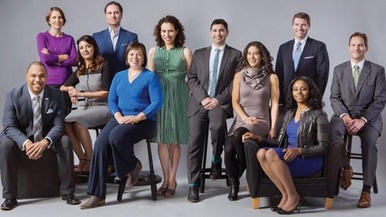
The new face of Madison leadership
The men and women heading up local businesses, nonprofits, schools and government are younger, more diverse and more creatively collaborative than ever before. And they’re just getting started.
A little more than sixteen years ago, the cover of Madison Magazine featured a group of Madison leaders including the mayor, fire chief, Dane County executive and district attorney, presidents of Madison Area Technical College and the University of Wisconsin System and others in positions of prominence. All were women. Every one. It was a vivid and powerful image of a historic, cultural change.
Here we go again. Madison leadership is going through a transformation as significant as the gender-dominated change of the late ’90s, only this one is far more diverse and reaches deeper into the civic structure. The image on this month’s cover is equally powerful and meaningful. The new face of leadership in Madison is younger, more colorful and more diverse by a much broader definition of diversity. Its impact on our community is already being felt in very important ways, and yet there is a clear sense of having just scratched the surface of what is possible. Make that what is probable. Change is here. More change is coming.
New leaders are emerging throughout Madison’s business, nonprofit, education and government sectors. While many positions of power, including police and fire chiefs, the head of the Urban League, county executive and, of course, Madison mayor, are held by, shall we say, more seasoned professionals, those same institutions also include young folks with important jobs, and many of them have relationships with the New City Leadership we’ve identified here.
The problem with starting such a list is ending it. It necessarily includes people for the positions they hold and/or the institutions they represent. Everett Mitchell, who recently announced his candidacy for a Dane County Circuit Court seat, is a community leader in a growing number of ways, but as director of community relations is also an important representative of new leadership at the University of Wisconsin–Madison. Likewise, Amy Gannon at Edgewood College, Sandy Morales at Big Brothers Big Sisters, Kevin Little at the Chamber of Commerce and Brennan Nardi at the Madison Community Foundation all combine personal and institutional leadership roles. Madison East principal Michael Hernandez is an example of the dynamic young talent superintendent Jennifer Cheatham is putting in leadership positions within the Madison Metropolitan School District even as Cheatham herself assumes a major leadership role with her vision for our schools and our community. Brandi Grayson is a new Madison leader who really emerged in the past year, giving a powerful voice to a new generation through her work with the Young, Gifted and Black Coalition. Others straddle the admittedly arbitrary dividing line of age and title and are already respected civic leaders, like Michael Johnson at the Boys & Girls Club, Henry Sanders at Madison365 and Annette Miller at MGE.
The eleven people featured in this story are therefore examples of a wider new leadership paradigm as much as they are singular leaders. However, collectively they represent something much greater. Put them in a room together and one realizes Madison has changed, profoundly and permanently. Perhaps a half a century of civic leadership has turned over, names that are or will be on buildings, schools and walls of honor. They have been succeeded by a new generation of leaders with new ideas, new values and new ways of leading. And the sheer breadth of this group is quite amazing.
Think about it: Madison schools, the Chamber of Commerce, United Way, Centro Hispano, the Madison Community Foundation, the Madison Common Council—some of Madison’s most important, influential and powerful institutions, all with new leaders. All are keenly aware of the issues we face together and they bring a fresh perspective and approach to those issues. All are fluent in cultural diversity, social justice, equity in opportunity, achievement and reward. All share a comfort with disruption, risk and change.
No one’s work depends on the makeup of civic leadership more than the head of the Chamber of Commerce, arguably the most important salesman in the city. Zach Brandon, just forty-two years old yet already three years into his tenure as president of the region’s most important business group, is mindful of the scope of the change. “It’s interesting to watch,” says Brandon, “because many cities, when a changing of the leadership guard occurs, they’ll go from [age] sixty-five to fifty or fifty-five. It’s generally an incremental change. It’s not a generational shift. It generally takes two of those changes and you really never get [to where we are now] because the people coming into these leadership positions are almost always in their fifties. So what’s exciting about what has occurred here in the last three or four years is we’ve jumped from incremental to fully disruptive. People who you would not have expected to get these jobs are getting these jobs. People who think a little bit differently and challenge the norm and the status quo, which is what the city needs.”
Madison Community Foundation president Bob Sorge is the oldest at forty-eight. Twenty-nine-year-old StartingBlock executive director Scott Resnick is the youngest. Madison alder Maurice Cheeks is thirty-one, United Way of Dane County president and CEO Renee Moe is thirty-nine. Centro Hispano executive director Karen Menéndez Coller is forty, Urban League of Greater Madison board of directors chair Nia Enemuoh-Trammell is forty-three, Madison schools superintendent Jennifer Cheatham is forty-four, as is University Research Park managing director Aaron Olver. Alder Shiva Bidar-Sielaff is forty-six and YWCA Madison CEO Rachel Krinsky is forty-seven. Not a Baby Boomer in the bunch.
The New Face of Madison Leadership is a generational blend of Gen Xers and Millennials. We need to understand that. In 2016—this year—Millennials, people born after 1980, will become the largest American generation. The significance of that looms large for Maurice Cheeks.
“In 2016, Millennials, immigrants, single women and minorities are considered the rising American electorate. So in 2016, this rising American electorate will be the majority of the voting age population in November. In 2020, Millennials alone will be the largest voting population in America.”
Cheeks defines Millennials as accustomed to a world of embracing diversity. “We grew up in a world that was rapidly changing. I think we’re particularly nimble and for as much as the Millennial generation gets a rap about being anti-establishment—which is not untrue—Millennials volunteer and participate in community service at a higher rate than any other generation. So they’re looking to serve. They’re looking to make our community better.”
Brandon doesn’t disagree. Rather, he views his generation, Gen X, as “the bridge generation.” “We’re the generation that can get Millennials to understand the power and value of foundations and institutions and enterprises of scale,” he says. “And we can hopefully get Boomers to understand inclusion.”
The bridge is built on a foundation made up of values that every one of these new leaders expresses in one form or another sincerely, comfortably, seemingly effortlessly. Diversity, risk, collaboration created with a comfort in disagreeing and a deliberate checking of egos at the door.
Cheatham said when she came to Madison she didn’t know “exactly what it was going to mean to be a leader among leaders in this city. I realized that there was something special going on and that I wanted to create some strong connections with this incoming group of new leaders because I felt that I might have an opportunity to create a kind of sounding board.” Cheatham said she knew she was “going to be learning a lot on the job,” and she wanted to be able to connect with people she could “talk honestly with about things like how to lead.” And that’s been exciting, says Cheatham. “I would say it is not only a group that is unafraid of discussing explicitly issues of racial equity, really taking on this question of innovation and systemic change, pace of change, but it’s a group that is willing to disagree with one another, too. We support one another and I feel that support every day. But, we’re not just patting each other on the back. This group really pushes each other’s thinking. Which is, I think, really unique.”
Rachel Krinsky describes the group as having these conversations “on purpose, directly and accurately.” “We don’t always agree with each other; we’re still willing to talk to each other. Some of us are really sticking our necks out. All this talk is critically important, but we all also have to be working strategically. We all have to have actual plans for how we’re going to make change in places that we control.”
This group follows at least one familiar Madison leadership pattern: Some came here for school or professional opportunities and stayed. Some were born here. Krinsky knows she is in part viewed as “the local girl done good.” “I am white, I grew up here and when I go to speak to the Attic Angels or whoever it is, those people were my teachers, and I can say stuff to other white people and to the white Boomers, and because I speak like they do and I probably grew up with their daughters, they will hear me.”
Nia Enemuoh-Trammell, too, is a native, with a different perspective that feels more complementary than opposite. “This is my home and it means a great deal to me and I think that’s one of the main reasons why I do everything that I do beyond my nine to five. As a child growing up here, I never imagined in my life that I’d be in the position I’m in right now. I mean, I grew up in the Northport Drive apartments, and if I didn’t have the right interventions, if I didn’t have the right people mentoring me and molding me, I’d probably be a statistic.” In other words, she knows the importance of role models. “I hear a lot of discussion about how young people of color may not necessarily see where they fit in into the city and I want to change that.”
So the journey to this place, to Madison and to leadership, is another example of diversity, and it also influences one’s perspective on what it means to lead.
“If you ask me,” says Karen Menéndez Coller, “I’m from Los Angeles and people laugh, my husband laughs, because I don’t say I’m from El Salvador. I’m from L.A., that’s where I’m from. But I feel like because of that, when I see things here going a certain way for our community, it’s frustrating, so I feel like I need to be more vocal. And I think because of the stage of migration where our families are at, our families aren’t at the place where they can be loud and advocate. They just aren’t because they’re still trying to be a part of this culture and adjusting to Dane County.”
Over the past few months, she’s recognized that Centro Hispano “has to play that role because otherwise we’re not going to be creating a system that understands our families and that allows them to grow and to eventually speak out the way they need to. So I’m not as comfortable with that. This whole leader in town is a little odd, because I’ve worked in programs before, and I’m always about ‘What are we doing with the community?’ And here I feel like a title is put on me, but it’s more because I’m associated with this place. So I do accept it and I think it’s important to have it, otherwise we won’t be moving the needle eventually with our programs, which is important.”
Through different paths and with different perspectives, these new leaders are ultimately creating better support and a stronger community. Brandon says “almost unintentionally,” this group builds off each other’s thought leadership.
“That’s where the noncompetitiveness manifests itself and allows us to see that the path forward is without a lot of internal conflict. That’s not to say people won’t get hurt and people won’t get bumped, but overall, it’s a group of leaders who embrace each other’s thought leadership and build upon it and aren’t afraid to say, ‘This is somebody else’s idea but I think I can make it happen.’ Mo [Cheeks] says we have to become discontent and I say we need to put that on a platform somewhere. Aaron [Olver] says we need a new vision for how we build and create density around our research enterprises and we’ll stand ready to do what we can and make each other better. Everyone on [this] list, I have one-on-one conversations with that have not really anything to do with the Chamber and the United Way, or the Chamber and Centro Hispano, or the Chamber and the school district. A lot of times it’s us asking questions about what would you do? There’s a confidence that’s built into that to say these are people I don’t spend every day with, but if I need advice I can put down my shield, I can lower my guard and I can ask a colleague who’s not on my board or not even in the same space I’m in and say, ‘What do you think about this?’ That makes all of us better. Not just the eleven of us, but the whole community better.”
Scott Resnick says he also “can say something complimentary about every leader in this group. “It’s the vision of thinking bigger than oneself or one’s organization. It’s also using each other as resources. It’s not this competitive nature that you might see in another city or another community that is saying this faction against that faction. It’s trying to build a better Madison. But any one of us, whoever needs anything, we’re there to support each other.”
Bob Sorge views that support as giving added dimension to the role of the Madison Community Foundation. “When I look at this common shared vision and when I talk about our unique value and when I look at others and where their unique value is, it’s this acknowledgement that [the Community Foundation] can’t do everything. We wouldn’t be successful trying to take everything on, but we need to know where to go and we need that trust. I think it’s going to come down to trust and it always comes down to trust. I want other leaders to be able to trust me and the Community Foundation to help them accomplish what they want to accomplish in this community.”
These new leaders have worked and continue to work with each other in different groupings, in part because of past relationships and in part because of current jobs. Brandon was an alder. He and Olver worked together at the Wisconsin Department of Commerce. Enemuoh-Trammel is on the Madison Police and Fire Commission. Resnick co-owns a successful tech business and is a former alder (and mayoral candidate, the first out of a sub-group of qualified candidates in this group of eleven). Moe has been with United Way for what feels like forever, and thus knows everybody. Menéndez works closely with Cheatham. Cheatham does the same with Brandon and Sorge. Cheeks just took a new gig at the Madison office of the global technology company MIOSoft. You get the picture.
These folks are connected to the community, to sectors of interest and influence and to each other. “It goes back to wanting to really have relationships, meaningful relationships and really good conversations and a sense of approaching challenges together,” says Madison alder and UW Health director of community partnerships Bidar-Sielaff.
“Some of those challenges were not figured out by the previous generation of leaders,” she continues. “And it’s not a criticism, it’s just they’re such big challenges. I think it’s the sense of responsibility and opportunity and a vision that we can live in this world that’s so diverse and we can talk to each other [understanding that] we all come from different backgrounds, race, ethnicity, places that we’re working.”
Leadership is not about “dictating or using the structure of power to get what you want,” says Olver. “It’s about building some consensus rounded in facts that helps people get to a new place that they couldn’t have gotten to without it.”
Menéndez Coller sums it up: “We work very well together,” she says. “It’s funny, I’m never drawing color lines with them. We’re almost generationally at that point, and the reason I feel I get along with Jen [Cheatham] is because we see the world the same way. I was told one time that everybody sees the world in a different way, but I feel like with this group of people, we all see it the same way. So there are some understood values that we all have, and then, okay, what do we do next? We’re ready to take the next step."
So, what does come next? If this next generation leadership change means anything, it means change begets more change.
“That’s what’s interesting to me,” says Brandon. “What’s coming next are the thirty-year-olds: Kevin [Little], Brandi [Grayson], Mo [Cheeks]. “But it’s also prodigal sons like Henry [Sanders], who have been focused nationally and are now coming back and becoming locally focused, talking about doing a newspaper or an online presence that is so laser focused. Those are the people who I’m excited about because there seems to be a five-to-ten-year span of the next generation that is equally as good. That bodes well.”
For Cheeks, who is both there, and here, it’s about getting it right—in less than ten years. “When I say get it right, I mean, we’re going to absolutely experience above-average-paced growth and significant increase in diversity. It’s my passion to look forward to help us appreciate what we have today in Madison. Being relatively new to the community, I don’t have the benefit of resting on the nostalgia and the fondness that so many people feel for this community. I appreciate that vicariously, but I feel that it’s really important with the unique lens that I have as a professional, as a biracial man, as one of the few minorities in this leadership position. And as a young homeowner, as someone who’s just starting a family, I feel that I have a unique lens that’s not better than anyone else’s, but I’m looking forward. It’s not enough to appreciate how cool this city has been. It’s important for me to ensure the kids in third grade are going to have awesome treatment and graduate in ten years, a city that appreciates everything they bring together as the next generation of Madisonians, as the working class, the professional class.”
“Yes, we are doing lots of things and trying to make a change and we still have room to go,” says Krinsky. “If we can learn to say that over and over and over again and mean it, that would be huge.”
Moe says to do that, build on the last three decades of thinking evolution and then “break systems down and build them back up again, take the best of what has been and build the best of what’s to come. I think that’s just a really remarkable and wonderful opportunity for all of us to grab those batons and run the next leg.”
Resnick agrees we’re not there yet. “Transportation is one of the biggest mistakes we’ve been making. We’re a good biking city. Are we a great biking city anymore? Or, where’s the rail? Where’s the community transportation or public transportation? These are all big threats. It’s a livelihood—we all want to live here in Madison. We all care about this community. There are some challenges ahead. I think the one really positive side is you have a number of leaders working toward these bigger challenges and willing to take on new ideas and willing to talk about action instead of just plans.”
Enemuoh-Trammel says that unlike some, she really believes Madison is a unique place. “For people who are considering leaving Madison because they don’t think culturally it provides them what they’re looking for or professionally they’re not able to grow, I want them to know that there is a place for them. It’s about connecting with the right people and the community and I think that there’s room for all of us to be at the table and to do something tremendous for this community, and that’s what I love so much about Madison.”
“The city has so much potential,” says Brandon, “but it requires not just the people, but the leadership to be discontent with where they are and to say it’s not good enough to just sit around and talk about how good we are, how good we have been. It’s important to think about how good we could be and where we’re falling short in the pursuit of that.”
After several decades—a generation—“how good we are” and “how good we’ve been” have been exposed in various ways. That sentiment is an example of a community resting on its laurels to the point of calcification. It is an excuse for not seeking and eventually embracing new ideas and for shunning risk. And, perhaps most importantly, it is not shared. Criticizing any individual is neither useful nor necessary. But there is a connection between an over-appreciation for the good old days and the sense of surprise, if not disbelief, that Madison has some of the worst racial disparities in the country.
These new leaders praise their predecessors and express admiration for their contributions, while at the same time recognize the value of, and need for, change.
“I don’t want to make too much out of generational differences,” says Olver, “because I admire my parents’ generation, the Mark Bugher [who Olver succeeded at University Research Park] generation. I directly admire Mark Bugher as an example, so I don’t want to make too much out of the passing of the torch. But I think it might be fair to say the Baby Boom generation sort of viewed the opportunity of joining the Peace Corps and getting involved in government and changing the world that way. This generation thinks, ‘I need to start an organization or start a company and create something new that interacts beyond a formal structure.’”
Create something. These are perhaps the two words most descriptive of the vision, explicit or implicit, of Madison’s new leaders.
The history of Madison is built on appreciation of the many shoulders upon which we all stand that feels unique even in a country that has mythologized its forbearers. Doty begat Nolen, who begat Frautschi, who begat Nelson, who begat Soglin. The New Leaders of 2016 are respectful of these self-made, white men who built—yes, let’s get it over with—the Best City to Live in America. But we were getting perilously close to caricature, the civic equivalent of the movieGroundhog Day, stuck in the ’60s, with fifteen-minute commutes, unlimited job openings at Oscar Mayer and in state government and plenty of parking.
Like many more self-aware cities, Madison is now viewing its future through the lenses of innovation, diversity, creativity, globalism and change. Our physical landscape is beginning to reflect that future. And, now, our leadership is as well.
Madison Magazine.
The men and women heading up local businesses, nonprofits, schools and government are younger, more diverse and more creatively collaborative than ever before. And they’re just getting started.
A little more than sixteen years ago, the cover of Madison Magazine featured a group of Madison leaders including the mayor, fire chief, Dane County executive and district attorney, presidents of Madison Area Technical College and the University of Wisconsin System and others in positions of prominence. All were women. Every one. It was a vivid and powerful image of a historic, cultural change.
Here we go again. Madison leadership is going through a transformation as significant as the gender-dominated change of the late ’90s, only this one is far more diverse and reaches deeper into the civic structure. The image on this month’s cover is equally powerful and meaningful. The new face of leadership in Madison is younger, more colorful and more diverse by a much broader definition of diversity. Its impact on our community is already being felt in very important ways, and yet there is a clear sense of having just scratched the surface of what is possible. Make that what is probable. Change is here. More change is coming.
New leaders are emerging throughout Madison’s business, nonprofit, education and government sectors. While many positions of power, including police and fire chiefs, the head of the Urban League, county executive and, of course, Madison mayor, are held by, shall we say, more seasoned professionals, those same institutions also include young folks with important jobs, and many of them have relationships with the New City Leadership we’ve identified here.
The problem with starting such a list is ending it. It necessarily includes people for the positions they hold and/or the institutions they represent. Everett Mitchell, who recently announced his candidacy for a Dane County Circuit Court seat, is a community leader in a growing number of ways, but as director of community relations is also an important representative of new leadership at the University of Wisconsin–Madison. Likewise, Amy Gannon at Edgewood College, Sandy Morales at Big Brothers Big Sisters, Kevin Little at the Chamber of Commerce and Brennan Nardi at the Madison Community Foundation all combine personal and institutional leadership roles. Madison East principal Michael Hernandez is an example of the dynamic young talent superintendent Jennifer Cheatham is putting in leadership positions within the Madison Metropolitan School District even as Cheatham herself assumes a major leadership role with her vision for our schools and our community. Brandi Grayson is a new Madison leader who really emerged in the past year, giving a powerful voice to a new generation through her work with the Young, Gifted and Black Coalition. Others straddle the admittedly arbitrary dividing line of age and title and are already respected civic leaders, like Michael Johnson at the Boys & Girls Club, Henry Sanders at Madison365 and Annette Miller at MGE.
The eleven people featured in this story are therefore examples of a wider new leadership paradigm as much as they are singular leaders. However, collectively they represent something much greater. Put them in a room together and one realizes Madison has changed, profoundly and permanently. Perhaps a half a century of civic leadership has turned over, names that are or will be on buildings, schools and walls of honor. They have been succeeded by a new generation of leaders with new ideas, new values and new ways of leading. And the sheer breadth of this group is quite amazing.
Think about it: Madison schools, the Chamber of Commerce, United Way, Centro Hispano, the Madison Community Foundation, the Madison Common Council—some of Madison’s most important, influential and powerful institutions, all with new leaders. All are keenly aware of the issues we face together and they bring a fresh perspective and approach to those issues. All are fluent in cultural diversity, social justice, equity in opportunity, achievement and reward. All share a comfort with disruption, risk and change.
No one’s work depends on the makeup of civic leadership more than the head of the Chamber of Commerce, arguably the most important salesman in the city. Zach Brandon, just forty-two years old yet already three years into his tenure as president of the region’s most important business group, is mindful of the scope of the change. “It’s interesting to watch,” says Brandon, “because many cities, when a changing of the leadership guard occurs, they’ll go from [age] sixty-five to fifty or fifty-five. It’s generally an incremental change. It’s not a generational shift. It generally takes two of those changes and you really never get [to where we are now] because the people coming into these leadership positions are almost always in their fifties. So what’s exciting about what has occurred here in the last three or four years is we’ve jumped from incremental to fully disruptive. People who you would not have expected to get these jobs are getting these jobs. People who think a little bit differently and challenge the norm and the status quo, which is what the city needs.”
Madison Community Foundation president Bob Sorge is the oldest at forty-eight. Twenty-nine-year-old StartingBlock executive director Scott Resnick is the youngest. Madison alder Maurice Cheeks is thirty-one, United Way of Dane County president and CEO Renee Moe is thirty-nine. Centro Hispano executive director Karen Menéndez Coller is forty, Urban League of Greater Madison board of directors chair Nia Enemuoh-Trammell is forty-three, Madison schools superintendent Jennifer Cheatham is forty-four, as is University Research Park managing director Aaron Olver. Alder Shiva Bidar-Sielaff is forty-six and YWCA Madison CEO Rachel Krinsky is forty-seven. Not a Baby Boomer in the bunch.
The New Face of Madison Leadership is a generational blend of Gen Xers and Millennials. We need to understand that. In 2016—this year—Millennials, people born after 1980, will become the largest American generation. The significance of that looms large for Maurice Cheeks.
“In 2016, Millennials, immigrants, single women and minorities are considered the rising American electorate. So in 2016, this rising American electorate will be the majority of the voting age population in November. In 2020, Millennials alone will be the largest voting population in America.”
Cheeks defines Millennials as accustomed to a world of embracing diversity. “We grew up in a world that was rapidly changing. I think we’re particularly nimble and for as much as the Millennial generation gets a rap about being anti-establishment—which is not untrue—Millennials volunteer and participate in community service at a higher rate than any other generation. So they’re looking to serve. They’re looking to make our community better.”
Brandon doesn’t disagree. Rather, he views his generation, Gen X, as “the bridge generation.” “We’re the generation that can get Millennials to understand the power and value of foundations and institutions and enterprises of scale,” he says. “And we can hopefully get Boomers to understand inclusion.”
The bridge is built on a foundation made up of values that every one of these new leaders expresses in one form or another sincerely, comfortably, seemingly effortlessly. Diversity, risk, collaboration created with a comfort in disagreeing and a deliberate checking of egos at the door.
Cheatham said when she came to Madison she didn’t know “exactly what it was going to mean to be a leader among leaders in this city. I realized that there was something special going on and that I wanted to create some strong connections with this incoming group of new leaders because I felt that I might have an opportunity to create a kind of sounding board.” Cheatham said she knew she was “going to be learning a lot on the job,” and she wanted to be able to connect with people she could “talk honestly with about things like how to lead.” And that’s been exciting, says Cheatham. “I would say it is not only a group that is unafraid of discussing explicitly issues of racial equity, really taking on this question of innovation and systemic change, pace of change, but it’s a group that is willing to disagree with one another, too. We support one another and I feel that support every day. But, we’re not just patting each other on the back. This group really pushes each other’s thinking. Which is, I think, really unique.”
Rachel Krinsky describes the group as having these conversations “on purpose, directly and accurately.” “We don’t always agree with each other; we’re still willing to talk to each other. Some of us are really sticking our necks out. All this talk is critically important, but we all also have to be working strategically. We all have to have actual plans for how we’re going to make change in places that we control.”
This group follows at least one familiar Madison leadership pattern: Some came here for school or professional opportunities and stayed. Some were born here. Krinsky knows she is in part viewed as “the local girl done good.” “I am white, I grew up here and when I go to speak to the Attic Angels or whoever it is, those people were my teachers, and I can say stuff to other white people and to the white Boomers, and because I speak like they do and I probably grew up with their daughters, they will hear me.”
Nia Enemuoh-Trammell, too, is a native, with a different perspective that feels more complementary than opposite. “This is my home and it means a great deal to me and I think that’s one of the main reasons why I do everything that I do beyond my nine to five. As a child growing up here, I never imagined in my life that I’d be in the position I’m in right now. I mean, I grew up in the Northport Drive apartments, and if I didn’t have the right interventions, if I didn’t have the right people mentoring me and molding me, I’d probably be a statistic.” In other words, she knows the importance of role models. “I hear a lot of discussion about how young people of color may not necessarily see where they fit in into the city and I want to change that.”
So the journey to this place, to Madison and to leadership, is another example of diversity, and it also influences one’s perspective on what it means to lead.
“If you ask me,” says Karen Menéndez Coller, “I’m from Los Angeles and people laugh, my husband laughs, because I don’t say I’m from El Salvador. I’m from L.A., that’s where I’m from. But I feel like because of that, when I see things here going a certain way for our community, it’s frustrating, so I feel like I need to be more vocal. And I think because of the stage of migration where our families are at, our families aren’t at the place where they can be loud and advocate. They just aren’t because they’re still trying to be a part of this culture and adjusting to Dane County.”
Over the past few months, she’s recognized that Centro Hispano “has to play that role because otherwise we’re not going to be creating a system that understands our families and that allows them to grow and to eventually speak out the way they need to. So I’m not as comfortable with that. This whole leader in town is a little odd, because I’ve worked in programs before, and I’m always about ‘What are we doing with the community?’ And here I feel like a title is put on me, but it’s more because I’m associated with this place. So I do accept it and I think it’s important to have it, otherwise we won’t be moving the needle eventually with our programs, which is important.”
Through different paths and with different perspectives, these new leaders are ultimately creating better support and a stronger community. Brandon says “almost unintentionally,” this group builds off each other’s thought leadership.
“That’s where the noncompetitiveness manifests itself and allows us to see that the path forward is without a lot of internal conflict. That’s not to say people won’t get hurt and people won’t get bumped, but overall, it’s a group of leaders who embrace each other’s thought leadership and build upon it and aren’t afraid to say, ‘This is somebody else’s idea but I think I can make it happen.’ Mo [Cheeks] says we have to become discontent and I say we need to put that on a platform somewhere. Aaron [Olver] says we need a new vision for how we build and create density around our research enterprises and we’ll stand ready to do what we can and make each other better. Everyone on [this] list, I have one-on-one conversations with that have not really anything to do with the Chamber and the United Way, or the Chamber and Centro Hispano, or the Chamber and the school district. A lot of times it’s us asking questions about what would you do? There’s a confidence that’s built into that to say these are people I don’t spend every day with, but if I need advice I can put down my shield, I can lower my guard and I can ask a colleague who’s not on my board or not even in the same space I’m in and say, ‘What do you think about this?’ That makes all of us better. Not just the eleven of us, but the whole community better.”
Scott Resnick says he also “can say something complimentary about every leader in this group. “It’s the vision of thinking bigger than oneself or one’s organization. It’s also using each other as resources. It’s not this competitive nature that you might see in another city or another community that is saying this faction against that faction. It’s trying to build a better Madison. But any one of us, whoever needs anything, we’re there to support each other.”
Bob Sorge views that support as giving added dimension to the role of the Madison Community Foundation. “When I look at this common shared vision and when I talk about our unique value and when I look at others and where their unique value is, it’s this acknowledgement that [the Community Foundation] can’t do everything. We wouldn’t be successful trying to take everything on, but we need to know where to go and we need that trust. I think it’s going to come down to trust and it always comes down to trust. I want other leaders to be able to trust me and the Community Foundation to help them accomplish what they want to accomplish in this community.”
These new leaders have worked and continue to work with each other in different groupings, in part because of past relationships and in part because of current jobs. Brandon was an alder. He and Olver worked together at the Wisconsin Department of Commerce. Enemuoh-Trammel is on the Madison Police and Fire Commission. Resnick co-owns a successful tech business and is a former alder (and mayoral candidate, the first out of a sub-group of qualified candidates in this group of eleven). Moe has been with United Way for what feels like forever, and thus knows everybody. Menéndez works closely with Cheatham. Cheatham does the same with Brandon and Sorge. Cheeks just took a new gig at the Madison office of the global technology company MIOSoft. You get the picture.
These folks are connected to the community, to sectors of interest and influence and to each other. “It goes back to wanting to really have relationships, meaningful relationships and really good conversations and a sense of approaching challenges together,” says Madison alder and UW Health director of community partnerships Bidar-Sielaff.
“Some of those challenges were not figured out by the previous generation of leaders,” she continues. “And it’s not a criticism, it’s just they’re such big challenges. I think it’s the sense of responsibility and opportunity and a vision that we can live in this world that’s so diverse and we can talk to each other [understanding that] we all come from different backgrounds, race, ethnicity, places that we’re working.”
Leadership is not about “dictating or using the structure of power to get what you want,” says Olver. “It’s about building some consensus rounded in facts that helps people get to a new place that they couldn’t have gotten to without it.”
Menéndez Coller sums it up: “We work very well together,” she says. “It’s funny, I’m never drawing color lines with them. We’re almost generationally at that point, and the reason I feel I get along with Jen [Cheatham] is because we see the world the same way. I was told one time that everybody sees the world in a different way, but I feel like with this group of people, we all see it the same way. So there are some understood values that we all have, and then, okay, what do we do next? We’re ready to take the next step."
So, what does come next? If this next generation leadership change means anything, it means change begets more change.
“That’s what’s interesting to me,” says Brandon. “What’s coming next are the thirty-year-olds: Kevin [Little], Brandi [Grayson], Mo [Cheeks]. “But it’s also prodigal sons like Henry [Sanders], who have been focused nationally and are now coming back and becoming locally focused, talking about doing a newspaper or an online presence that is so laser focused. Those are the people who I’m excited about because there seems to be a five-to-ten-year span of the next generation that is equally as good. That bodes well.”
For Cheeks, who is both there, and here, it’s about getting it right—in less than ten years. “When I say get it right, I mean, we’re going to absolutely experience above-average-paced growth and significant increase in diversity. It’s my passion to look forward to help us appreciate what we have today in Madison. Being relatively new to the community, I don’t have the benefit of resting on the nostalgia and the fondness that so many people feel for this community. I appreciate that vicariously, but I feel that it’s really important with the unique lens that I have as a professional, as a biracial man, as one of the few minorities in this leadership position. And as a young homeowner, as someone who’s just starting a family, I feel that I have a unique lens that’s not better than anyone else’s, but I’m looking forward. It’s not enough to appreciate how cool this city has been. It’s important for me to ensure the kids in third grade are going to have awesome treatment and graduate in ten years, a city that appreciates everything they bring together as the next generation of Madisonians, as the working class, the professional class.”
“Yes, we are doing lots of things and trying to make a change and we still have room to go,” says Krinsky. “If we can learn to say that over and over and over again and mean it, that would be huge.”
Moe says to do that, build on the last three decades of thinking evolution and then “break systems down and build them back up again, take the best of what has been and build the best of what’s to come. I think that’s just a really remarkable and wonderful opportunity for all of us to grab those batons and run the next leg.”
Resnick agrees we’re not there yet. “Transportation is one of the biggest mistakes we’ve been making. We’re a good biking city. Are we a great biking city anymore? Or, where’s the rail? Where’s the community transportation or public transportation? These are all big threats. It’s a livelihood—we all want to live here in Madison. We all care about this community. There are some challenges ahead. I think the one really positive side is you have a number of leaders working toward these bigger challenges and willing to take on new ideas and willing to talk about action instead of just plans.”
Enemuoh-Trammel says that unlike some, she really believes Madison is a unique place. “For people who are considering leaving Madison because they don’t think culturally it provides them what they’re looking for or professionally they’re not able to grow, I want them to know that there is a place for them. It’s about connecting with the right people and the community and I think that there’s room for all of us to be at the table and to do something tremendous for this community, and that’s what I love so much about Madison.”
“The city has so much potential,” says Brandon, “but it requires not just the people, but the leadership to be discontent with where they are and to say it’s not good enough to just sit around and talk about how good we are, how good we have been. It’s important to think about how good we could be and where we’re falling short in the pursuit of that.”
After several decades—a generation—“how good we are” and “how good we’ve been” have been exposed in various ways. That sentiment is an example of a community resting on its laurels to the point of calcification. It is an excuse for not seeking and eventually embracing new ideas and for shunning risk. And, perhaps most importantly, it is not shared. Criticizing any individual is neither useful nor necessary. But there is a connection between an over-appreciation for the good old days and the sense of surprise, if not disbelief, that Madison has some of the worst racial disparities in the country.
These new leaders praise their predecessors and express admiration for their contributions, while at the same time recognize the value of, and need for, change.
“I don’t want to make too much out of generational differences,” says Olver, “because I admire my parents’ generation, the Mark Bugher [who Olver succeeded at University Research Park] generation. I directly admire Mark Bugher as an example, so I don’t want to make too much out of the passing of the torch. But I think it might be fair to say the Baby Boom generation sort of viewed the opportunity of joining the Peace Corps and getting involved in government and changing the world that way. This generation thinks, ‘I need to start an organization or start a company and create something new that interacts beyond a formal structure.’”
Create something. These are perhaps the two words most descriptive of the vision, explicit or implicit, of Madison’s new leaders.
The history of Madison is built on appreciation of the many shoulders upon which we all stand that feels unique even in a country that has mythologized its forbearers. Doty begat Nolen, who begat Frautschi, who begat Nelson, who begat Soglin. The New Leaders of 2016 are respectful of these self-made, white men who built—yes, let’s get it over with—the Best City to Live in America. But we were getting perilously close to caricature, the civic equivalent of the movieGroundhog Day, stuck in the ’60s, with fifteen-minute commutes, unlimited job openings at Oscar Mayer and in state government and plenty of parking.
Like many more self-aware cities, Madison is now viewing its future through the lenses of innovation, diversity, creativity, globalism and change. Our physical landscape is beginning to reflect that future. And, now, our leadership is as well.
Madison Magazine.
CENTRO IN THE NEWS - 2015
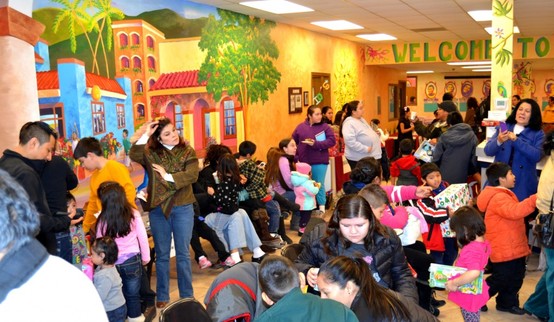
WAITING FOR LOS TRES REYES MAGOS
Once again, children will be forming a line to sit on the laps and get a regalo from Melchor, Gaspar, and Baltasar at Centro Hispano’s annual Tres Reyes Magos (Three Kings’ Day) celebration Jan. 8 at Centro on Madison’s south side.
A young person enjoys his regalo at a previous Tres Reyes Magos celebration at Centro.
According to Latino tradition, children receive presents on Jan. 6, “el día de Reyes,” the Day of the Kings, or the Wise Men. It is the Magi who brought the presents to the Baby Jesus, and tradition has it that they bring toys to the boys and girls who have been good. Centro traditionally hosts its Tres Reyes Magos celebration on the Friday closest to Jan. 6.
“It’s a big day for children,” Centro Hispano Executive Director Karen Menendez Coller tells Madison365. “It’s the day that the three kings come and bring gifts to Jesus. It’s a celebration of family and community. It’s one of our fun events and one of our favorites.”
In many Hispanic countries, ‘El Dia de Reyes'(Three Kings Day) represents the height of the Christmas season and is the day when people exchange gifts, rather than on Dec. 25.
“There are going to be a lot of surprises at the event this year so I’m not going to give away too much,” smiles Menendez Coller. “But we will be giving out gifts and books to the children. There will be food and music and entertainment. It’s a great time as we wind down the holidays and celebrate the importance of family in our community.”
Traditionally, the event features many participants who are familiar with Centro Hispano, a cultural home for Dane County’s Latino population that provides social services, job training, educational opportunities, but Menendez Coller says that the Tres Reyes Magos celebration is for the whole community. “It’s open to everybody. I think it’s a good way to get a jump on what Centro is all about at the beginning of the year and to see our beautiful building and learn about all of the programs that we do,” she says. “It’s a great chance to meet our staff and some of our board members. It’s a nice warm event … very family friendly.”
Tres Reyes Magos celebration at Centro
The Tres Reyes Magos tradition is important for Latinos throughout the world and a magical event for children.
“I actually didn’t really celebrate Tres Reyes Magos until I came to the United States,” says Menendez Coller, who emigrated from El Salvador to Los Angeles when she was in middle school. “In El Salvador, we don’t celebrate it as much but it is a huge Mexican tradition. When I was in L.A., my family assimilated a lot of Mexican culture in our lives and Tres Reyes Magos was one of those traditions.”
Sal Carranza, Al Felice, and Baltazar de Anda will once again be back to play the part of kings at the annual Tres Reyes Magos event.
“For many Latinos, spirituality is very important and it strengthens our community here in this country. It makes us feel like we are complete. It supports us through the many barriers that we face in the community,” Menendez Coller says. “The end of the Christmas season is really significant for us as we wind down the year and start fresh. El Dia de los Tres Reyes Magos is a big, important part of our culture.”
The annual Tres Reyes Magos celebration will be held Jan. 8, 4-7 p.m. at Centro Hispano, 810 W. Badger Rd. All are welcome.
Written by David Dahmer
Madison 365
Once again, children will be forming a line to sit on the laps and get a regalo from Melchor, Gaspar, and Baltasar at Centro Hispano’s annual Tres Reyes Magos (Three Kings’ Day) celebration Jan. 8 at Centro on Madison’s south side.
A young person enjoys his regalo at a previous Tres Reyes Magos celebration at Centro.
According to Latino tradition, children receive presents on Jan. 6, “el día de Reyes,” the Day of the Kings, or the Wise Men. It is the Magi who brought the presents to the Baby Jesus, and tradition has it that they bring toys to the boys and girls who have been good. Centro traditionally hosts its Tres Reyes Magos celebration on the Friday closest to Jan. 6.
“It’s a big day for children,” Centro Hispano Executive Director Karen Menendez Coller tells Madison365. “It’s the day that the three kings come and bring gifts to Jesus. It’s a celebration of family and community. It’s one of our fun events and one of our favorites.”
In many Hispanic countries, ‘El Dia de Reyes'(Three Kings Day) represents the height of the Christmas season and is the day when people exchange gifts, rather than on Dec. 25.
“There are going to be a lot of surprises at the event this year so I’m not going to give away too much,” smiles Menendez Coller. “But we will be giving out gifts and books to the children. There will be food and music and entertainment. It’s a great time as we wind down the holidays and celebrate the importance of family in our community.”
Traditionally, the event features many participants who are familiar with Centro Hispano, a cultural home for Dane County’s Latino population that provides social services, job training, educational opportunities, but Menendez Coller says that the Tres Reyes Magos celebration is for the whole community. “It’s open to everybody. I think it’s a good way to get a jump on what Centro is all about at the beginning of the year and to see our beautiful building and learn about all of the programs that we do,” she says. “It’s a great chance to meet our staff and some of our board members. It’s a nice warm event … very family friendly.”
Tres Reyes Magos celebration at Centro
The Tres Reyes Magos tradition is important for Latinos throughout the world and a magical event for children.
“I actually didn’t really celebrate Tres Reyes Magos until I came to the United States,” says Menendez Coller, who emigrated from El Salvador to Los Angeles when she was in middle school. “In El Salvador, we don’t celebrate it as much but it is a huge Mexican tradition. When I was in L.A., my family assimilated a lot of Mexican culture in our lives and Tres Reyes Magos was one of those traditions.”
Sal Carranza, Al Felice, and Baltazar de Anda will once again be back to play the part of kings at the annual Tres Reyes Magos event.
“For many Latinos, spirituality is very important and it strengthens our community here in this country. It makes us feel like we are complete. It supports us through the many barriers that we face in the community,” Menendez Coller says. “The end of the Christmas season is really significant for us as we wind down the year and start fresh. El Dia de los Tres Reyes Magos is a big, important part of our culture.”
The annual Tres Reyes Magos celebration will be held Jan. 8, 4-7 p.m. at Centro Hispano, 810 W. Badger Rd. All are welcome.
Written by David Dahmer
Madison 365
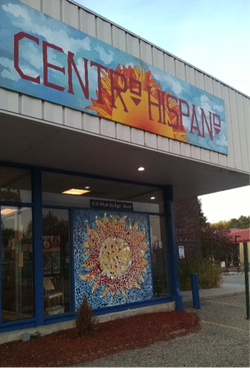
A refugee in Madison's first challenge: English
By Lisa Speckhard | Thu, 11/12/2015 - 10:42amIn a room with brightly painted murals of Hispanic heroes, a group of refugees from Bhutan, armed with No. 2 pencils and an eagerness to converse, sits down to begin English class.
All are there to learn, and the air crackled with mental effort.
The one exception was a pupil who sat playing with a scarf and singing a multi-lingual version of “Happy Birthday” to herself, which started in English and gradually tumbled into her native tongue.
This refugee was Trishna, and she isn’t more than 3 years old.
Centro Hispano hosts refugee ESL classes taught by Literacy Network (Lisa Speckhard/Madison Commons)
Trishna is the granddaughter of one of the students, and she was there to play. As a child, it is her right to be oblivious to what is going on in the refugees’ world. The Syrian refugee crisis has shifted the national spotlight to U.S. refugee policies making it harder for Madison residents to have the same attitude.
The United States has raised the national cap on refugees from 70,000 this year to 85,000 in 2016 and 100,000 in 2017. This national issue has local impact: Madison received 47 refugees in 2015.
For the Bhutanese refugees in this room, their first challenge is language. Madison’s Literacy Network offers ESL classes at Centro Hispano, an organization that serves Dane County’s Latino population, making the classroom feel like a true “melting pot.”
Gregg Williard, the ESL Group Instructor and Refugee Program Manager, had two volunteers to help him work around the small room and offer assistance to his eager students.
At the beginner table sat Pabi. Outfitted in a purple sweater, green vest and blue Hawaiian print skirt, she set out to conquer her workbook.
Pabi, like most others in the room, is Lhotshampa. The Lhotshampa are traditionally Hindu and speak Nepali, making them an ethnic, linguistic and religious minority in Buddhist Bhutan. In the 1980s, the Bhutanese government began a campaign for “One Country, One People” – and the Lhotshampa did not fit into that definition of “one.” They protested, and the government violently retaliated. They fled, and after waiting in Nepal for 20 years hoping to return home, many Lhotshampa began resettling in the US in 2008.
Pabi arrived in the U.S. in 2012 and is focused on the next phase of her life: mastering English.
“Practice, practice, practice!” she said. “Hard!”
She can express a lot with her face, tone and few English words, including the international practice of bragging about one’s children.
“All married,” she said happily. She has 10 grandchildren, but family reunions are overcast by the knowledge that a brother and sister are still overseas.
While enthusiastic to communicate, Pabi was very aware of the logistical limits of her current grasp on English.
“Hospital no English, doctor – hard!” she said.
The room was filled with a lot of honest tries. Slowly spoken English questions and answers were punctuated with quick Nepali translations.
This cheerful room presented a hopeful picture of refugee resettlement, but in 2012 the Center for Disease Control and Prevention found elevated suicide rates among Bhutanese refugees in the U.S. Almost 20 percent exhibited symptoms of depression and anxiety. The study cited language barriers, the inability to provide for family and stress about family still in their home country as causes.
Once in America, refugees must mourn the loss of their own culture while jumping into a new culture crash-course.
Mary Flynn is the Program Manager of Refugee Resettlement at Lutheran Social Services of Wisconsin and Upper Michigan. The program is one of several that partners with the state of Wisconsin to provide case management and job placement for incoming refugees. It also coordinates volunteer “sponsors,” who can take on a variety of roles from locating furniture for new refugee families to checking in on that family once a week for the first three months.
Resettling is complex, and “we cannot do it all and we need help,” Flynn said. “It’s the little things that have the most power.”
For example, she said, refugees often need help sorting their mail, as they tend to throw out bills and save the Publishers Clearing House newsletter.
The Literacy Network also depends on volunteers like the ones in Pabi’s class, who have their hands full helping five or six students fill out their workbooks.
Lutheran Social Services and The Literacy Network rely on volunteers, and increased quotas will likely mean increased need.
“It’s not enough that we bring people here. Are they going to be here and are they going to be okay?” Flynn asked.
By Lisa Speckhard | Thu, 11/12/2015 - 10:42amIn a room with brightly painted murals of Hispanic heroes, a group of refugees from Bhutan, armed with No. 2 pencils and an eagerness to converse, sits down to begin English class.
All are there to learn, and the air crackled with mental effort.
The one exception was a pupil who sat playing with a scarf and singing a multi-lingual version of “Happy Birthday” to herself, which started in English and gradually tumbled into her native tongue.
This refugee was Trishna, and she isn’t more than 3 years old.
Centro Hispano hosts refugee ESL classes taught by Literacy Network (Lisa Speckhard/Madison Commons)
Trishna is the granddaughter of one of the students, and she was there to play. As a child, it is her right to be oblivious to what is going on in the refugees’ world. The Syrian refugee crisis has shifted the national spotlight to U.S. refugee policies making it harder for Madison residents to have the same attitude.
The United States has raised the national cap on refugees from 70,000 this year to 85,000 in 2016 and 100,000 in 2017. This national issue has local impact: Madison received 47 refugees in 2015.
For the Bhutanese refugees in this room, their first challenge is language. Madison’s Literacy Network offers ESL classes at Centro Hispano, an organization that serves Dane County’s Latino population, making the classroom feel like a true “melting pot.”
Gregg Williard, the ESL Group Instructor and Refugee Program Manager, had two volunteers to help him work around the small room and offer assistance to his eager students.
At the beginner table sat Pabi. Outfitted in a purple sweater, green vest and blue Hawaiian print skirt, she set out to conquer her workbook.
Pabi, like most others in the room, is Lhotshampa. The Lhotshampa are traditionally Hindu and speak Nepali, making them an ethnic, linguistic and religious minority in Buddhist Bhutan. In the 1980s, the Bhutanese government began a campaign for “One Country, One People” – and the Lhotshampa did not fit into that definition of “one.” They protested, and the government violently retaliated. They fled, and after waiting in Nepal for 20 years hoping to return home, many Lhotshampa began resettling in the US in 2008.
Pabi arrived in the U.S. in 2012 and is focused on the next phase of her life: mastering English.
“Practice, practice, practice!” she said. “Hard!”
She can express a lot with her face, tone and few English words, including the international practice of bragging about one’s children.
“All married,” she said happily. She has 10 grandchildren, but family reunions are overcast by the knowledge that a brother and sister are still overseas.
While enthusiastic to communicate, Pabi was very aware of the logistical limits of her current grasp on English.
“Hospital no English, doctor – hard!” she said.
The room was filled with a lot of honest tries. Slowly spoken English questions and answers were punctuated with quick Nepali translations.
This cheerful room presented a hopeful picture of refugee resettlement, but in 2012 the Center for Disease Control and Prevention found elevated suicide rates among Bhutanese refugees in the U.S. Almost 20 percent exhibited symptoms of depression and anxiety. The study cited language barriers, the inability to provide for family and stress about family still in their home country as causes.
Once in America, refugees must mourn the loss of their own culture while jumping into a new culture crash-course.
Mary Flynn is the Program Manager of Refugee Resettlement at Lutheran Social Services of Wisconsin and Upper Michigan. The program is one of several that partners with the state of Wisconsin to provide case management and job placement for incoming refugees. It also coordinates volunteer “sponsors,” who can take on a variety of roles from locating furniture for new refugee families to checking in on that family once a week for the first three months.
Resettling is complex, and “we cannot do it all and we need help,” Flynn said. “It’s the little things that have the most power.”
For example, she said, refugees often need help sorting their mail, as they tend to throw out bills and save the Publishers Clearing House newsletter.
The Literacy Network also depends on volunteers like the ones in Pabi’s class, who have their hands full helping five or six students fill out their workbooks.
Lutheran Social Services and The Literacy Network rely on volunteers, and increased quotas will likely mean increased need.
“It’s not enough that we bring people here. Are they going to be here and are they going to be okay?” Flynn asked.
|
El Ejecutivo del Condado de Dane, Joe Parisi, y la Directora Ejecutiva de Centro Hispano, Karen Menéndez Coller (izquierda), destacaron la importancia de Fiesta Hispana para la comunidad del condado de Dane. Asimismo, Coller enfatizó que éste es el evento de la comunidad. La Directora Ejecutiva de Centro Hispano, Karen Menéndez Coller Fiesta Hispana es un evento cultural y familiar gratuito y está abierto a todo el mundo. Para obtener más información acerca de Centro Hispano, visite la página web aqui. Written by Madison365 staff |
EDIBLE MADISON
NOTABLE EDIBLES Summer 2016 Issue
June 17, 2016El Mercadito de Centro: Connecting to Culture through FoodBy Wendy Allen | Photos By Kirk Lawler0
Much of one’s culture is held within food traditions. The ingredients, methods and words that go into creating a dish teach and remind us of our heritage. Centro Hispano in South Madison has built many of its programs around the idea that food— growing, preparing and eating it—forges a direct connection to and preserves generational knowledge and cultural pride.
In its second year, Centro Hispano’s farmers market, El Mercadito de Centro, has become a hub for South Madison’s Latino community, providing a place for residents to not only purchase high quality, farm-fresh food in an area of the city that does not have easy access to supermarkets, but also to have fun and learn.
This year, the market will offer cooking demonstrations in Spanish and English by aspiring chef Ana Brito, and the demo dishes “will be full of Latin flavors and stories,” says Mariela Quesada Centeno, director of adult programs at Centro Hispano.
For farmers, the market provides a place to sell their cultural foods, such as verdolágas (purslane) and chilacayote (figleaf gourd). Some vendors also have a connection to the Farley Center’s farm incubator program, which supports farm businesses run by immigrant farmers, and Spring Rose Cooperative, which sprang from the organization's first farm incubator program in 2010. (Read more about the Farley Center’s farm incubator program in our spring 2014 issue and on our website.)
As an extra bonus to get fresh produce onto the tables of families, El Mercadito de Centro participates in Madison’s Double Your Dollars program, which matches SNAP transactions made at participating farmers markets, and Centro Hispano has developed a cookbook featuring cross-cultural recipes and ingredients. Centro Hispano also operates a community garden and hosts workshops taught by fellow community members. “We want to start planting cultural seeds with the hope that we will harvest stories, knowledge, empowerment, and of course, decadent recipes,” says Mariela.
“El Mercadito de Centro started last summer as a way to provide Centro Hispano's clients and neighbors the opportunity to buy fresh vegetables and fruits during their visit to Centro and to nearby businesses,” says Mariela. “The market's overall mission is to offer an open and healthy place where members of Madison’s southside community can share their cultural heritage and culinary traditions.”
El Mercadito de Centro will be open weekly on Tuesdays, 9:00 a.m. to 1:00 p.m., from June through October at Centro Hispano, 810 West Badger Road, Madison.
Wendy Allen was born and raised in the cornfields of Iowa, and after multiple attempts to escape to other parts of the world, she found herself pulled back to the black Midwestern earth of her roots. She now calls the Driftless region of Southwest Wisconsin home, where she found a passion for organic food and discovered that fields can be filled with things other than corn. Still the wandering soul, she travels far and often, and has come to know that the most meaningful art is nestled in the places one calls home.
NOTABLE EDIBLES Summer 2016 Issue
June 17, 2016El Mercadito de Centro: Connecting to Culture through FoodBy Wendy Allen | Photos By Kirk Lawler0
Much of one’s culture is held within food traditions. The ingredients, methods and words that go into creating a dish teach and remind us of our heritage. Centro Hispano in South Madison has built many of its programs around the idea that food— growing, preparing and eating it—forges a direct connection to and preserves generational knowledge and cultural pride.
In its second year, Centro Hispano’s farmers market, El Mercadito de Centro, has become a hub for South Madison’s Latino community, providing a place for residents to not only purchase high quality, farm-fresh food in an area of the city that does not have easy access to supermarkets, but also to have fun and learn.
This year, the market will offer cooking demonstrations in Spanish and English by aspiring chef Ana Brito, and the demo dishes “will be full of Latin flavors and stories,” says Mariela Quesada Centeno, director of adult programs at Centro Hispano.
For farmers, the market provides a place to sell their cultural foods, such as verdolágas (purslane) and chilacayote (figleaf gourd). Some vendors also have a connection to the Farley Center’s farm incubator program, which supports farm businesses run by immigrant farmers, and Spring Rose Cooperative, which sprang from the organization's first farm incubator program in 2010. (Read more about the Farley Center’s farm incubator program in our spring 2014 issue and on our website.)
As an extra bonus to get fresh produce onto the tables of families, El Mercadito de Centro participates in Madison’s Double Your Dollars program, which matches SNAP transactions made at participating farmers markets, and Centro Hispano has developed a cookbook featuring cross-cultural recipes and ingredients. Centro Hispano also operates a community garden and hosts workshops taught by fellow community members. “We want to start planting cultural seeds with the hope that we will harvest stories, knowledge, empowerment, and of course, decadent recipes,” says Mariela.
“El Mercadito de Centro started last summer as a way to provide Centro Hispano's clients and neighbors the opportunity to buy fresh vegetables and fruits during their visit to Centro and to nearby businesses,” says Mariela. “The market's overall mission is to offer an open and healthy place where members of Madison’s southside community can share their cultural heritage and culinary traditions.”
El Mercadito de Centro will be open weekly on Tuesdays, 9:00 a.m. to 1:00 p.m., from June through October at Centro Hispano, 810 West Badger Road, Madison.
Wendy Allen was born and raised in the cornfields of Iowa, and after multiple attempts to escape to other parts of the world, she found herself pulled back to the black Midwestern earth of her roots. She now calls the Driftless region of Southwest Wisconsin home, where she found a passion for organic food and discovered that fields can be filled with things other than corn. Still the wandering soul, she travels far and often, and has come to know that the most meaningful art is nestled in the places one calls home.
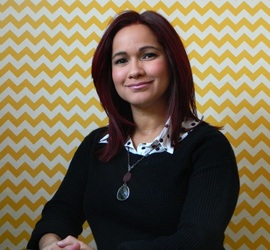
Centro Hispano elects new Board of Directors President
Sujhey Beisser has been elected the president of the board of directors for Centro Hispano of Dane County which works to improve the quality of life for Latinos and others living in Dane County by empowering youth, strengthening families, and engaging the community.
A native of Venezuela, Beisser first started on the Centro Hispano board of directors in April of 2008. She has served as treasurer of the board for two different terms and has also served as secretary. Beisser was a member of the Executive Committee during the hiring process of the executive director two different times including the hiring of current Executive Director Karen Menendez Coller in August of 2013.
Beisser has been a member of Centro Hispano’s membership committee for 5 years and chairperson of the scholarship committee for 4 years. Along with Brenda Gonzalez and Tania Ibarra, Beisser started the silent auction at Centro Hispano Annual Banquet in 2010 that has raised thousands of dollars for Centro’s programs over the years.
By day, Beisser is the Branch Manager for Park Bank in Sun Prairie, the creator of and writer for Five Senses Palate, and the mother of two. As president of the board of directors of Centro Hispano, she takes over the reins from Interim President A. David Dahmer.
Sujhey Beisser has been elected the president of the board of directors for Centro Hispano of Dane County which works to improve the quality of life for Latinos and others living in Dane County by empowering youth, strengthening families, and engaging the community.
A native of Venezuela, Beisser first started on the Centro Hispano board of directors in April of 2008. She has served as treasurer of the board for two different terms and has also served as secretary. Beisser was a member of the Executive Committee during the hiring process of the executive director two different times including the hiring of current Executive Director Karen Menendez Coller in August of 2013.
Beisser has been a member of Centro Hispano’s membership committee for 5 years and chairperson of the scholarship committee for 4 years. Along with Brenda Gonzalez and Tania Ibarra, Beisser started the silent auction at Centro Hispano Annual Banquet in 2010 that has raised thousands of dollars for Centro’s programs over the years.
By day, Beisser is the Branch Manager for Park Bank in Sun Prairie, the creator of and writer for Five Senses Palate, and the mother of two. As president of the board of directors of Centro Hispano, she takes over the reins from Interim President A. David Dahmer.
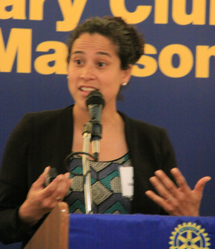
ROTARY CLUB OF MADISON
WE SUCCEEDED: LATINOS IN DANE COUNTY
Karen Menendez Coller, Executive Director of Centro Hispano, began her passionate and substantive discourse by reminding us that Latinos in Dane County are a) a growing community, b) here to stay, and c) a presence.
Statistics show that Latino numbers in our community are great. An 80% growth in population in 5 years, 2010-2015, puts their current buying power at $1.5 trillion. There is a 5:3 ratio of men to women as migrant work brings men to the area. Yet, all the charts and statistics, including those documenting low incomes, poor education rates, and housing problems show us nothing about who Latinos are as fellow community members. Most of us, she says, know little about how they are hardworking, take care of their own, and live by strong family values.
Karen emphasized three key ingredients for equity. First is Stability in the Home. Chaos, unemployment, and chronic stresses work against such stability. Many have lost their social network and cope through addiction. Quality support services are critical, but the fact that a single staff member at Centro Hispano now sees 400 cases per year demonstrates the need for change. An example of one new program that provides a pipeline for job placement and career advancement is Caminos Certified Nursing Assistant Program, a collaborative effort between Centro Hispano and Madison College. Of 70 students enrolled since January 2015, 73% graduated and 82% are employed. Their incomes rose from as low as $7.25 per hour to as high as $20 per hour. 79% of the students went from unemployed or part-time employed to full-time positions.
The second ingredient is Youth Aspirations. Karen says that 31% of the Latino population in the county are under age 18, most of them living with the heavy issues of alcohol, drugs, and risk of pregnancy. The answer is to foster hope and meaning, and the way to do this is to engage the students in school. Centro is using a technique called asset mapping to help youth create a pipeline to graduation. Mentors in the community help student see themselves as well as their peers as assets in the community. Centro Hispano provides a base where each young person can feel safe as he or she engages in fun and meaningful activities.
The third ingredient is the Neighborhood Environment. Outreach, including wellness activities and food equity opportunities, smooths the way toward the end goal: A Thriving Community. Reframing Latino Community Solutions means full inclusion: a community that tells us what they want and becomes engaged in getting there. Solutions include having a community development perspective, using a strategic perspective, and knowing who drives the agenda: the families themselves.
May We Succeed. Here’s to Karen’s call for innovation and engagement NOW.
WE SUCCEEDED: LATINOS IN DANE COUNTY
Karen Menendez Coller, Executive Director of Centro Hispano, began her passionate and substantive discourse by reminding us that Latinos in Dane County are a) a growing community, b) here to stay, and c) a presence.
Statistics show that Latino numbers in our community are great. An 80% growth in population in 5 years, 2010-2015, puts their current buying power at $1.5 trillion. There is a 5:3 ratio of men to women as migrant work brings men to the area. Yet, all the charts and statistics, including those documenting low incomes, poor education rates, and housing problems show us nothing about who Latinos are as fellow community members. Most of us, she says, know little about how they are hardworking, take care of their own, and live by strong family values.
Karen emphasized three key ingredients for equity. First is Stability in the Home. Chaos, unemployment, and chronic stresses work against such stability. Many have lost their social network and cope through addiction. Quality support services are critical, but the fact that a single staff member at Centro Hispano now sees 400 cases per year demonstrates the need for change. An example of one new program that provides a pipeline for job placement and career advancement is Caminos Certified Nursing Assistant Program, a collaborative effort between Centro Hispano and Madison College. Of 70 students enrolled since January 2015, 73% graduated and 82% are employed. Their incomes rose from as low as $7.25 per hour to as high as $20 per hour. 79% of the students went from unemployed or part-time employed to full-time positions.
The second ingredient is Youth Aspirations. Karen says that 31% of the Latino population in the county are under age 18, most of them living with the heavy issues of alcohol, drugs, and risk of pregnancy. The answer is to foster hope and meaning, and the way to do this is to engage the students in school. Centro is using a technique called asset mapping to help youth create a pipeline to graduation. Mentors in the community help student see themselves as well as their peers as assets in the community. Centro Hispano provides a base where each young person can feel safe as he or she engages in fun and meaningful activities.
The third ingredient is the Neighborhood Environment. Outreach, including wellness activities and food equity opportunities, smooths the way toward the end goal: A Thriving Community. Reframing Latino Community Solutions means full inclusion: a community that tells us what they want and becomes engaged in getting there. Solutions include having a community development perspective, using a strategic perspective, and knowing who drives the agenda: the families themselves.
May We Succeed. Here’s to Karen’s call for innovation and engagement NOW.
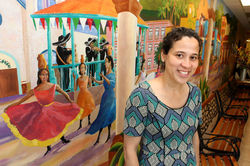
THE CAPITAL TIMES
HAS MADISON'S FOCUS ON BLACKS PUSHED LATINOS TO THE SHADOWS?
Read more
Two years ago this month, Karen Menendez Coller left Los Angeles for Madison with her husband, a pediatrician who was bound for American Family Children’s Hospital. Two months later, she unexpectedly became executive director of Centro Hispano of Dane County.
Coller, who is 40, left war-torn El Salvador with her family at age 14 and grew up in a predominately Latino neighborhood of Los Angeles. She eventually earned a Ph.D. from Johns Hopkins University in public health. Most recently she was a faculty member at UCLA. She came to Madison intending to work at the University of Wisconsin, but the prospect of doing hands-on work in the Latino community at Centro Hispano was too compelling.
Either one-on-one or before a crowd, she exudes energy and optimism. Yet when I asked her last week to reflect broadly on her work for Latinos in Madison thus far, Coller said this: “Over the last year or more I’ve been feeling particularly isolated in the community, feeling a little bit like an outsider, feeling a little bit like I’m in the shadows, not really understood.”
She continued: “By ‘me,’ I mean as a Latina woman being a part of this community. I think there are a lot of assumptions about our community and a lot of them are very superficial. They’ve caught me off guard.” These days, she said, her goal is “to clarify things and bring us out of the shadows, so to speak.”
I gleaned from a lengthy interview and by hearing her speak to groups twice recently that she believes the city’s dominant white majority suspects — falsely — that many Latinos are undocumented and that they struggle with English. They are also seen as hard-working, making economic progress and having strong family values. In general, Latinos are not seen as being in crisis, which Coller said is not necessarily the case.
“Centro,” as it’s called, is a nonprofit agency based in south Madison that provides social services and job training, and also serves as a cultural center for Latinos and other immigrants. Its storefront headquarters is just west of Park Street and north of the Beltline, about a five-minute walk from Fountain of Life Covenant Church, home of the Rev. Alex Gee and his heavily publicized Justified Anger movement.
That geographic link tees up this question: Has the strong focus on African-American issues growing from disparities measured in the “Race to Equity” report and the intensity of the Justified Anger grassroots movement diminished public attention on challenges facing Latinos?
Coller responded: “I'm going to be honest, Paul, I saw that data in the report, it’s not anything that I haven’t seen in many other places. But there is such an awakening to those disparities that it impedes being able to shift to another struggling population.”
She imagines mainstream Madison might think this: “ ‘We’re just realizing that there’s this (black) crisis. So how can we really take on another group that’s here and we don’t really understand, and from what I hear they’re doing OK? They’re going to be just fine; we’ll worry about them later.’ ”
She added: “There are complexities that tie our community and the African-American community together, and you realize that we’re all in crisis, really. … We are so small here in Madison, but you really see segregation, separation by poverty, by opportunity, by health. The south side is really suffering.
“I would love for our families to feel like they have a home here,” Coller said. “The sense of isolation is really an issue for me. But I don’t want it to be a community where people are giving to them; I want them to feel empowered to make changes in their lives.”
The nearly two-year media and community focus on African-American issues in Madison seems defensible on merit, but one wonders if the very bright spotlight has contributed to the “shadow” to which Coller refers.
Is it indeed a zero-sum game, a one-crisis-at-a-time sort of thing?
In the past two years, the Cap Times — and I personally — have been intermittently criticized for inadequately writing about non-black minority communities, principally the Latino community. My defense, such as it is, is to point to the glaring disparity metrics afflicting the black community coupled with the blossoming grassroots African-American movement of civic leaders and everyday citizens.
Now the major fundraising effort by Justified Anger — fueled by a $150,000 gift from our philanthropic arm, the Evjue Foundation — is fully under way on the heels of a huge kickoff event at the Alliant Energy Center two weeks ago.
So perhaps it is time to step back and broaden the focus.
A week after Justified Anger’s big blowout, I listened with a much smaller audience as Coller and her staffers told funders and Centro board members about the agency’s programs over a buffet dinner at Centro headquarters.
In that presentation and another at Downtown Rotary, Coller pointed to a nearly 80-percent growth of Wisconsin’s Latino population between 2000 and 2010, and a 101-percent increase in Dane County during the same period. Nearly two-thirds of Latinos in Wisconsin were born in the United States and 83 percent speak English only or at least speak English “well or very well,” she said. The Latino unemployment rate is low, she said, but their incomes are also low.
So, I ask her in the interview, what would you like white Madisonians to think about and do to help Latinos?
“We’ve got to take a couple of steps back and just think about equity,” she said, “just what does equity mean and how does it affect all of Madison, even low-income white Madisonians?”
Look for ways to get involved, she said, visit Centro, meet the kids, attend their festivals and enjoy their culture.
She added, “So that people aren’t seeing us just because of the issues that we have, but because of the assets that we lend. I think if we try to take a step back and just see each other as part of a greater community, I think we would really come to a good understanding about who we are, what our differences are, and how we can become more of an equitable society.
“When it’s this thing that we have to fix, it just keeps the divide because ‘I'm the one who’s going to fix you.’ So I would love it if we could take a step back and just try to interact with each other better.”
As she spoke, I wondered, how is this recurrent theme of racial and ethnic separation and isolation so prominent in such a generous and, at least outwardly, open-minded city?
That’s a riddle worth pondering.
HAS MADISON'S FOCUS ON BLACKS PUSHED LATINOS TO THE SHADOWS?
Read more
Two years ago this month, Karen Menendez Coller left Los Angeles for Madison with her husband, a pediatrician who was bound for American Family Children’s Hospital. Two months later, she unexpectedly became executive director of Centro Hispano of Dane County.
Coller, who is 40, left war-torn El Salvador with her family at age 14 and grew up in a predominately Latino neighborhood of Los Angeles. She eventually earned a Ph.D. from Johns Hopkins University in public health. Most recently she was a faculty member at UCLA. She came to Madison intending to work at the University of Wisconsin, but the prospect of doing hands-on work in the Latino community at Centro Hispano was too compelling.
Either one-on-one or before a crowd, she exudes energy and optimism. Yet when I asked her last week to reflect broadly on her work for Latinos in Madison thus far, Coller said this: “Over the last year or more I’ve been feeling particularly isolated in the community, feeling a little bit like an outsider, feeling a little bit like I’m in the shadows, not really understood.”
She continued: “By ‘me,’ I mean as a Latina woman being a part of this community. I think there are a lot of assumptions about our community and a lot of them are very superficial. They’ve caught me off guard.” These days, she said, her goal is “to clarify things and bring us out of the shadows, so to speak.”
I gleaned from a lengthy interview and by hearing her speak to groups twice recently that she believes the city’s dominant white majority suspects — falsely — that many Latinos are undocumented and that they struggle with English. They are also seen as hard-working, making economic progress and having strong family values. In general, Latinos are not seen as being in crisis, which Coller said is not necessarily the case.
“Centro,” as it’s called, is a nonprofit agency based in south Madison that provides social services and job training, and also serves as a cultural center for Latinos and other immigrants. Its storefront headquarters is just west of Park Street and north of the Beltline, about a five-minute walk from Fountain of Life Covenant Church, home of the Rev. Alex Gee and his heavily publicized Justified Anger movement.
That geographic link tees up this question: Has the strong focus on African-American issues growing from disparities measured in the “Race to Equity” report and the intensity of the Justified Anger grassroots movement diminished public attention on challenges facing Latinos?
Coller responded: “I'm going to be honest, Paul, I saw that data in the report, it’s not anything that I haven’t seen in many other places. But there is such an awakening to those disparities that it impedes being able to shift to another struggling population.”
She imagines mainstream Madison might think this: “ ‘We’re just realizing that there’s this (black) crisis. So how can we really take on another group that’s here and we don’t really understand, and from what I hear they’re doing OK? They’re going to be just fine; we’ll worry about them later.’ ”
She added: “There are complexities that tie our community and the African-American community together, and you realize that we’re all in crisis, really. … We are so small here in Madison, but you really see segregation, separation by poverty, by opportunity, by health. The south side is really suffering.
“I would love for our families to feel like they have a home here,” Coller said. “The sense of isolation is really an issue for me. But I don’t want it to be a community where people are giving to them; I want them to feel empowered to make changes in their lives.”
The nearly two-year media and community focus on African-American issues in Madison seems defensible on merit, but one wonders if the very bright spotlight has contributed to the “shadow” to which Coller refers.
Is it indeed a zero-sum game, a one-crisis-at-a-time sort of thing?
In the past two years, the Cap Times — and I personally — have been intermittently criticized for inadequately writing about non-black minority communities, principally the Latino community. My defense, such as it is, is to point to the glaring disparity metrics afflicting the black community coupled with the blossoming grassroots African-American movement of civic leaders and everyday citizens.
Now the major fundraising effort by Justified Anger — fueled by a $150,000 gift from our philanthropic arm, the Evjue Foundation — is fully under way on the heels of a huge kickoff event at the Alliant Energy Center two weeks ago.
So perhaps it is time to step back and broaden the focus.
A week after Justified Anger’s big blowout, I listened with a much smaller audience as Coller and her staffers told funders and Centro board members about the agency’s programs over a buffet dinner at Centro headquarters.
In that presentation and another at Downtown Rotary, Coller pointed to a nearly 80-percent growth of Wisconsin’s Latino population between 2000 and 2010, and a 101-percent increase in Dane County during the same period. Nearly two-thirds of Latinos in Wisconsin were born in the United States and 83 percent speak English only or at least speak English “well or very well,” she said. The Latino unemployment rate is low, she said, but their incomes are also low.
So, I ask her in the interview, what would you like white Madisonians to think about and do to help Latinos?
“We’ve got to take a couple of steps back and just think about equity,” she said, “just what does equity mean and how does it affect all of Madison, even low-income white Madisonians?”
Look for ways to get involved, she said, visit Centro, meet the kids, attend their festivals and enjoy their culture.
She added, “So that people aren’t seeing us just because of the issues that we have, but because of the assets that we lend. I think if we try to take a step back and just see each other as part of a greater community, I think we would really come to a good understanding about who we are, what our differences are, and how we can become more of an equitable society.
“When it’s this thing that we have to fix, it just keeps the divide because ‘I'm the one who’s going to fix you.’ So I would love it if we could take a step back and just try to interact with each other better.”
As she spoke, I wondered, how is this recurrent theme of racial and ethnic separation and isolation so prominent in such a generous and, at least outwardly, open-minded city?
That’s a riddle worth pondering.
LA COMUNIDAD NEWS
the capital times
the isthmus
THE ISTHMUS
The Wisconsin State Journal
The Madison Times
The star
Community Invited to Tutor Kids
By Rebecca Rudolph
Closing the achievement gap is an often talked about goal in the Sun Prairie Area School District, and the Schools of Hope AmeriCorps project is offering a means for community volunteers to help.
Schools of Hope is a tutoring program C.H. Bird, Creekside, Northside and Westside elementary schools have been using since 2005 in an effort to offer one-on-one math and literacy help for struggling students.
“You really can make a difference with just a half an hour with a student,” Faith Lowry, tutor coordinator based out of Westside Elementary School, said. “It takes time to build a relationship, but, once you get comfortable with them, the student does learn with that one-on-one attention.”
She is one of two AmeriCorps tutor coordinators working with the Sun Prairie elementary schools. United Way of Dane County and Centro Hispano of Dane County also partner to make the program possible.
Each tutoring session is about half an hour long, and volunteers can help out for that time, or longer – whatever fits with their schedule, Lowry said.
“We’re always in need of more volunteers,” Lowry said. “It really depends each year (on teacher referrals)… but, really, there is a need.”
To become a tutor, those interested can apply on Schools of Hope’s website. Applicants will be asked to sign a disclosure form, which will allow for a background check. After that, a tutor coordinator will be contacted, who will talk to potential volunteers about their interest and skill set. After that, volunteers will be asked to complete a training.
One training session from 5-7 p.m. on Wednesday, Oct. 22 at Creekside Elementary School.
After that, Lowry and Sun Prairie’s other tutor coordinator, Rebekkah Rubin, can offer advice and resources for volunteers if needed.
Schools of Hope is also present in Prairie View Middle School and Cardinal Heights Upper Middle School. This math and literacy tutoring program is directed by Urban League of Greater Madison.
For more information, visit schoolsofhope.org.
By Rebecca Rudolph
Closing the achievement gap is an often talked about goal in the Sun Prairie Area School District, and the Schools of Hope AmeriCorps project is offering a means for community volunteers to help.
Schools of Hope is a tutoring program C.H. Bird, Creekside, Northside and Westside elementary schools have been using since 2005 in an effort to offer one-on-one math and literacy help for struggling students.
“You really can make a difference with just a half an hour with a student,” Faith Lowry, tutor coordinator based out of Westside Elementary School, said. “It takes time to build a relationship, but, once you get comfortable with them, the student does learn with that one-on-one attention.”
She is one of two AmeriCorps tutor coordinators working with the Sun Prairie elementary schools. United Way of Dane County and Centro Hispano of Dane County also partner to make the program possible.
Each tutoring session is about half an hour long, and volunteers can help out for that time, or longer – whatever fits with their schedule, Lowry said.
“We’re always in need of more volunteers,” Lowry said. “It really depends each year (on teacher referrals)… but, really, there is a need.”
To become a tutor, those interested can apply on Schools of Hope’s website. Applicants will be asked to sign a disclosure form, which will allow for a background check. After that, a tutor coordinator will be contacted, who will talk to potential volunteers about their interest and skill set. After that, volunteers will be asked to complete a training.
One training session from 5-7 p.m. on Wednesday, Oct. 22 at Creekside Elementary School.
After that, Lowry and Sun Prairie’s other tutor coordinator, Rebekkah Rubin, can offer advice and resources for volunteers if needed.
Schools of Hope is also present in Prairie View Middle School and Cardinal Heights Upper Middle School. This math and literacy tutoring program is directed by Urban League of Greater Madison.
For more information, visit schoolsofhope.org.
THE WISCONSIN STATE JOURNAL
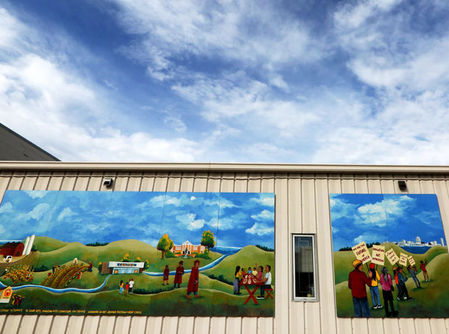
Madison in 100 objects: Centro Hispano mural
Abigail Becker
The story painted within a vibrant mural outside of the Centro Hispano building at 810 W. Badger Road is a familiar one to many members of Madison’s Latino community.
It is a story of immigration, of migrant workers on Wisconsin farms, of adapting to a new community and setting a path for a better life.
The mural, titled “Story of Immigration” and installed in June 2013, shows migrant workers on Wisconsin farms tending fields and hauling produce to a canning factory.
Farther down the painted path, a family is seen seeking out Centro Hispano for help adjusting to new customs, a new language and a new environment. The story continues with images of a family celebrating with new college graduates.
Most importantly, the mural tells the story of how one generation endured hardship and difficulty so their children might pursue a better life.
Created in 1983 by a group of community volunteers, Centro Hispano is dedicated to assisting families with education, jobs and youth programs, while serving as a resource for the Latino community.
As Madison’s Latino population has grown, adding to the richness of the cultural fabric of the community, Centro Hispano has expanded along with it.
At the end of the mural is a quote from Cesar Chavez emphasizing giving back and investing in the community.
“We cannot seek achievement for ourselves and forget about progress and prosperity for our community,” it reads. “Our ambitions must be broad enough to include the aspirations and needs of others, for their sakes and for our own.”
Abigail Becker
The story painted within a vibrant mural outside of the Centro Hispano building at 810 W. Badger Road is a familiar one to many members of Madison’s Latino community.
It is a story of immigration, of migrant workers on Wisconsin farms, of adapting to a new community and setting a path for a better life.
The mural, titled “Story of Immigration” and installed in June 2013, shows migrant workers on Wisconsin farms tending fields and hauling produce to a canning factory.
Farther down the painted path, a family is seen seeking out Centro Hispano for help adjusting to new customs, a new language and a new environment. The story continues with images of a family celebrating with new college graduates.
Most importantly, the mural tells the story of how one generation endured hardship and difficulty so their children might pursue a better life.
Created in 1983 by a group of community volunteers, Centro Hispano is dedicated to assisting families with education, jobs and youth programs, while serving as a resource for the Latino community.
As Madison’s Latino population has grown, adding to the richness of the cultural fabric of the community, Centro Hispano has expanded along with it.
At the end of the mural is a quote from Cesar Chavez emphasizing giving back and investing in the community.
“We cannot seek achievement for ourselves and forget about progress and prosperity for our community,” it reads. “Our ambitions must be broad enough to include the aspirations and needs of others, for their sakes and for our own.”
THE MADISON TIMES
2nd Annual Latino Art Fair
David Dahmer
David Dahmer
The Madison Times
Fiesta Hispana 2014
David Dahmer
David Dahmer
The Madison Times
Central Park Sessions Benefit Centro Hispano
David Dahmer
David Dahmer
WORT Radio - The Eight o' Clock buzz
Finding a Home for Central American Refugees
Monday, 21 July 2014 | buzz
Last week, Madison Mayor Paul Soglin confirmed that the Federal Emergency Management Agency had contacted the City of Madison about finding a place to temporarily house 150 to 250 unaccompanied children emigrating from Central America. Officials in Milwaukee were also contacted. The request is part of a national effort to cope with an estimated 90,000 child refugees from El Salvador, Honduras and Guatemala attempting to enter the United States from Mexico. Centro Hispano, a Madison-area nonprofit and advocacy group for Latinos in Dane County, has been assisting the City of Madison to help find a site in response to the federal government’s request. Centro Hispano’s Executive Director, Karen Menendez Coller, joined Monday Buzz host Brian Standing in the studio.
To hear the rest of the interview, visit: http://www.wortfm.org/finding-a-home-for-central-american-refugees/
Monday, 21 July 2014 | buzz
Last week, Madison Mayor Paul Soglin confirmed that the Federal Emergency Management Agency had contacted the City of Madison about finding a place to temporarily house 150 to 250 unaccompanied children emigrating from Central America. Officials in Milwaukee were also contacted. The request is part of a national effort to cope with an estimated 90,000 child refugees from El Salvador, Honduras and Guatemala attempting to enter the United States from Mexico. Centro Hispano, a Madison-area nonprofit and advocacy group for Latinos in Dane County, has been assisting the City of Madison to help find a site in response to the federal government’s request. Centro Hispano’s Executive Director, Karen Menendez Coller, joined Monday Buzz host Brian Standing in the studio.
To hear the rest of the interview, visit: http://www.wortfm.org/finding-a-home-for-central-american-refugees/
The Wisconsin State Journal
The Courier
Dane County's Centro Hispano to host job fair Saturday
Posted on July 15, 2014 by Diane Graff
A first-of-its-kind job fair with a focus on employment and career opportunities for Dane County's Latino population will be held Saturday.
Centro Hispano, a Madison-based outreach group serving the county's Latino residents and families, will host the fair at it's center at 810 W. Badger Road with a kick off at 10 a.m. with Director Karen Menendez Coller and Dane County Executive Joe Parisi.
Fifty area employers and educational providers including UW Hospitals, Epic and Madison College will take part in the fair, which will also include music, food vendors and activities for children. Employers looking to diversity their workforce and individuals looking for the right job fit.
While the Job/Career Fair will certainly have a Latino theme to it, all are welcome and encouraged to participate.
“Good jobs and career pathways are important to our community, and this effort is in keeping with Centro Hispano’s mission to foster a ‘hub’ for the Latino community,” said Menendez Coller, Centro Hispano’s director. “It is vital that we build partnerships between community organizations, participants, educational providers and employers to have a sustainable impact.”
As the national economy and Dane County have rebounded from the recession, Parisi said some may still feel left behind economically and the Centro Hispano fair may open some doors.
“These are the kinds of positive actions we need to build a Dane County community that is moving forward together,” Parisi continued. “I applaud the partnership that brought these organizations together to serve Dane County residents and support their efforts to improve employment opportunities and pathways for all, including Dane County’s Latino residents.”
Posted on July 15, 2014 by Diane Graff
A first-of-its-kind job fair with a focus on employment and career opportunities for Dane County's Latino population will be held Saturday.
Centro Hispano, a Madison-based outreach group serving the county's Latino residents and families, will host the fair at it's center at 810 W. Badger Road with a kick off at 10 a.m. with Director Karen Menendez Coller and Dane County Executive Joe Parisi.
Fifty area employers and educational providers including UW Hospitals, Epic and Madison College will take part in the fair, which will also include music, food vendors and activities for children. Employers looking to diversity their workforce and individuals looking for the right job fit.
While the Job/Career Fair will certainly have a Latino theme to it, all are welcome and encouraged to participate.
“Good jobs and career pathways are important to our community, and this effort is in keeping with Centro Hispano’s mission to foster a ‘hub’ for the Latino community,” said Menendez Coller, Centro Hispano’s director. “It is vital that we build partnerships between community organizations, participants, educational providers and employers to have a sustainable impact.”
As the national economy and Dane County have rebounded from the recession, Parisi said some may still feel left behind economically and the Centro Hispano fair may open some doors.
“These are the kinds of positive actions we need to build a Dane County community that is moving forward together,” Parisi continued. “I applaud the partnership that brought these organizations together to serve Dane County residents and support their efforts to improve employment opportunities and pathways for all, including Dane County’s Latino residents.”
Channel 3000
Local efforts to help assimilate immigrants is important
Jul 14 2014 07:06:12 PM
Despite the inexcusable failure of our elected leaders in Washington to reform America’s outdated and ineffective immigration laws, more and more Hispanics are moving, living and working here. And that makes local efforts to help assimilate these immigrants even more important, especially making connections between willing workers and needy employers.
This Saturday’s Latino Job Fair is a great example of the partnerships needed to create the kind of inclusive community Dane County needs to be to be successful.
Billed a family-friendly, festive job fair, Centro Hispano is partnering with UW Hospitals, Edgewood College, Epic and more than 40 other area employers looking to diversify their workforce and promote employment and career opportunities.
It’s from 10 a.m. to 3 p.m. at Centro Hispano on Badger Road, and while it will certainly have a strong Latino feel to it, organizers are welcoming anyone to participate.
Frankly we welcome the Latino feel, and appreciate the partnership building the Dane County community of the future.
Jul 14 2014 07:06:12 PM
Despite the inexcusable failure of our elected leaders in Washington to reform America’s outdated and ineffective immigration laws, more and more Hispanics are moving, living and working here. And that makes local efforts to help assimilate these immigrants even more important, especially making connections between willing workers and needy employers.
This Saturday’s Latino Job Fair is a great example of the partnerships needed to create the kind of inclusive community Dane County needs to be to be successful.
Billed a family-friendly, festive job fair, Centro Hispano is partnering with UW Hospitals, Edgewood College, Epic and more than 40 other area employers looking to diversify their workforce and promote employment and career opportunities.
It’s from 10 a.m. to 3 p.m. at Centro Hispano on Badger Road, and while it will certainly have a strong Latino feel to it, organizers are welcoming anyone to participate.
Frankly we welcome the Latino feel, and appreciate the partnership building the Dane County community of the future.
The Madison times
Wisconsin state journal
CUNA Mutual donates $100,000 to Centro Hispano
June 28, 2014 7:30 am By Doug Erickson
The CUNA Mutual Foundation is donating $100,000 to Centro Hispano, a Madison nonprofit organization that aids Latinos and other immigrant populations.
Both the size of the grant and its unrestricted nature are unprecedented for Centro, said Karen Menendez Coller, Centro’s executive director. The money comes in the form of a capacity-building grant.
“Unlike other funding that is tied to programmatic outcomes, this is really an investment in Centro as an agency,” she said. “Basically, it’s an investment in our strategic plan, and that’s so important.”
The agency, 810 W. Badger Road, has an annual budget of about $1.4 million and employs 15 people, all full time, Coller said. The foundation was set to announce the donation at a strategy session for community leaders and supporters Friday evening at Centro.
In an interview, Steve Goldberg, the foundation’s executive director, said the grant is a vote of confidence in the organization’s vision and in Coller, most recently a faculty member at UCLA. She began last August. The foundation particularly likes Centro’s broad approach to strengthening families, from focusing on early childhood education to offering job training and helping people access health care, Goldberg said.
“I think for a long time Madison has needed a go-to source for that kind of help,” he said. “Much as the Urban League has become that source for the African-American population. I think Centro is well-poised to play that role for Hispanic families.”
The CUNA Mutual Foundation is the charitable arm of CUNA Mutual Group, a local provider of financial services to credit unions worldwide.
This is the third capacity-building grant the foundation has awarded this year. The others were to the Boys & Girls Club of Dane County and the Madison YWCA.
Friday’s announcement capped a big week for the foundation. On Thursday, it announced a commitment of $1.2 million toward a mentoring program in the Madison School District designed to keep new teachers. It was the largest grant the foundation has awarded.
June 28, 2014 7:30 am By Doug Erickson
The CUNA Mutual Foundation is donating $100,000 to Centro Hispano, a Madison nonprofit organization that aids Latinos and other immigrant populations.
Both the size of the grant and its unrestricted nature are unprecedented for Centro, said Karen Menendez Coller, Centro’s executive director. The money comes in the form of a capacity-building grant.
“Unlike other funding that is tied to programmatic outcomes, this is really an investment in Centro as an agency,” she said. “Basically, it’s an investment in our strategic plan, and that’s so important.”
The agency, 810 W. Badger Road, has an annual budget of about $1.4 million and employs 15 people, all full time, Coller said. The foundation was set to announce the donation at a strategy session for community leaders and supporters Friday evening at Centro.
In an interview, Steve Goldberg, the foundation’s executive director, said the grant is a vote of confidence in the organization’s vision and in Coller, most recently a faculty member at UCLA. She began last August. The foundation particularly likes Centro’s broad approach to strengthening families, from focusing on early childhood education to offering job training and helping people access health care, Goldberg said.
“I think for a long time Madison has needed a go-to source for that kind of help,” he said. “Much as the Urban League has become that source for the African-American population. I think Centro is well-poised to play that role for Hispanic families.”
The CUNA Mutual Foundation is the charitable arm of CUNA Mutual Group, a local provider of financial services to credit unions worldwide.
This is the third capacity-building grant the foundation has awarded this year. The others were to the Boys & Girls Club of Dane County and the Madison YWCA.
Friday’s announcement capped a big week for the foundation. On Thursday, it announced a commitment of $1.2 million toward a mentoring program in the Madison School District designed to keep new teachers. It was the largest grant the foundation has awarded.
The Capital Times
Centro Hispano wants the community to focus on disparities faced by Latinos in Dane County
June 26, 2014 12:35 pm By Pat Schneider
Latinos are the fastest growing ethnic group in Dane County, and the nonprofit social service agency Centro Hispano has been working for three decades to assist Latino families and build community.
Latino workers in Dane County often find themselves in low-paying jobs as they raise their families, leading to disparities in quality of life compared to white non-Latinos, says Karen Menendez Coller, executive director of Centro Hispano of Dane County.
“Disparity is something our families have been living with for some time now,” Menendez Coller said.
And as the Race to Equity report and Rev. Alex Gee’s Justified Anger Coalition are calling the community together to address disparities in the quality of life of African-Americans in Dane County, Menendez Coller wants to bring attention and resources to the disparities confronting Latinos.
She and the agency’s board of directors will convene a session Friday at the center to hear data about the Latino community and begin strategizing. Personal stories will be an important part of the information gathering in a series of sessions that Menendez Coller said she expects to eventually include the public.
But the numbers already reveal disparities.
Using Census data, HealthyDane.org puts the median annual household income of Latinos in Dane County at $39,360 for 2008-2012, compared to $27,833 for African-Americans and $66,150 for white non-Latinos.
Latino children in Dane County are more than four times more likely to be living in poverty – 24.5 percent – than are white, non-Latino children, Healthy Dane reports from 2008-2012 Census data. Just under one half of African-American children in the county were then living in poverty, Census data says.
And because many Latinos are immigrants who are getting their immigration papers and settling in a new country, they often must take jobs where they are not treated respectfully, Menendez Coller said. “They have a lot more challenges than other communities.”
“The basic programs we do at Centro are to reduce the disparities,” Menendez Coller said. She took over leadership of the center about a year ago, after moving to Madison from Los Angeles with her family.
The vibrant presence of the Latino community in Dane County, Wisconsin, has been a revelation to her.
“I am always really surprised when I go into schools here and they look identical to schools I saw in L.A.,” she said.
The Latino community is a young community as well. It is now the fastest growing ethnic student group in the Madison School District, and Menendez Coller says the local birth rate is three times that of white non-Latinos.
Menendez Coller is part of the Justified Anger Coalition, and says she fully supports those efforts to assist African-Americans. But she is eager to widen the focus to include the Latino community.
“Our programs are essential now to ensuring the success of adults and children as they transition to live in this new country,” she said.
June 26, 2014 12:35 pm By Pat Schneider
Latinos are the fastest growing ethnic group in Dane County, and the nonprofit social service agency Centro Hispano has been working for three decades to assist Latino families and build community.
Latino workers in Dane County often find themselves in low-paying jobs as they raise their families, leading to disparities in quality of life compared to white non-Latinos, says Karen Menendez Coller, executive director of Centro Hispano of Dane County.
“Disparity is something our families have been living with for some time now,” Menendez Coller said.
And as the Race to Equity report and Rev. Alex Gee’s Justified Anger Coalition are calling the community together to address disparities in the quality of life of African-Americans in Dane County, Menendez Coller wants to bring attention and resources to the disparities confronting Latinos.
She and the agency’s board of directors will convene a session Friday at the center to hear data about the Latino community and begin strategizing. Personal stories will be an important part of the information gathering in a series of sessions that Menendez Coller said she expects to eventually include the public.
But the numbers already reveal disparities.
Using Census data, HealthyDane.org puts the median annual household income of Latinos in Dane County at $39,360 for 2008-2012, compared to $27,833 for African-Americans and $66,150 for white non-Latinos.
Latino children in Dane County are more than four times more likely to be living in poverty – 24.5 percent – than are white, non-Latino children, Healthy Dane reports from 2008-2012 Census data. Just under one half of African-American children in the county were then living in poverty, Census data says.
And because many Latinos are immigrants who are getting their immigration papers and settling in a new country, they often must take jobs where they are not treated respectfully, Menendez Coller said. “They have a lot more challenges than other communities.”
“The basic programs we do at Centro are to reduce the disparities,” Menendez Coller said. She took over leadership of the center about a year ago, after moving to Madison from Los Angeles with her family.
The vibrant presence of the Latino community in Dane County, Wisconsin, has been a revelation to her.
“I am always really surprised when I go into schools here and they look identical to schools I saw in L.A.,” she said.
The Latino community is a young community as well. It is now the fastest growing ethnic student group in the Madison School District, and Menendez Coller says the local birth rate is three times that of white non-Latinos.
Menendez Coller is part of the Justified Anger Coalition, and says she fully supports those efforts to assist African-Americans. But she is eager to widen the focus to include the Latino community.
“Our programs are essential now to ensuring the success of adults and children as they transition to live in this new country,” she said.
The Capital City Hues
The capital city hues
The capital times
Wisconsin State Journal
Milwaukee courier
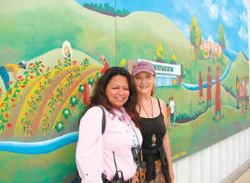
Q&A with Gloria Reyes
13 March 2014 By A. David Dahmer
Gloria Reyes (left) with Sharon Kilfoy in front of a mural at Centro Hispano
Madison has a lot of great community members.
But Gloria Reyes is truly a community member. Reyes is a true product of the Madison community where she was once boosted by a Centro Hispano scholarship.
Today, she is adamant about giving back and helping boost other young people’s hopes and dreams through her role as president of the board of directors for Centro Hispano of Dane County.
And as a long-time South Madison neighborhood police officer and City of Madison police detective, Reyes uses trust-based policing and a foundation of solid relationships to do her work in the community.
Since the beginning of 2013, Reyes has been assigned to the Special Investigations Unit where she employs a new way of policing using focused deterrence that identify violent offenders in our city and notifies them that they need to stop their behavior; otherwise the police department will utilize all of its resources to prosecute them to the full extent.
At the same time, Reyes also works with a community- against-violence team that offers resources that help people find employment, education, and housing to help ex-offenders integrate themselves back into our community.
On top of this, Reyes is the president of the Dane County Chapter of Latino Peace Officers Association and one of the founders of Amigos en Azul (Friends in Blue), a diverse group of officers dedicated to building trust and breaking down barriers between the police department and the Latino community and beyond.
The Madison Times caught up with the busy Gloria Reyes recently and she kindly answered some questions.
The Madison Times: Tell us about fulfilling your lifelong dream of becoming a detective that you realized not too long ago…
Gloria Reyes: I have always wanted to become a detective.
As long as I can remember it was my dream and passion to work in law enforcement.
However, I wasted many years listening to people who told me that I wasn’t strong enough or who told me I was too little or not smart enough.
You didn’t see many Latinas in law enforcement, so I believed for many years that maybe they were right.
There were many people and situations that paved the way helpng me achieve my dreams.
You will always have people who tell you that you can’t do something but you need to listen to those who will help you and support you.
That is something I tell to every young person I come in contact with.
I am one of those kids who oftentimes sat in the back of the classroom with no support.
I remember I couldn’t see the blackboard because my parents couldn’t afford to buy me glasses, so it was so much easier to sit in the back of the room and hide rather than tell people that we were too poor.
It is so much easier for teachers to pay attention to the students who are excelling and doing well, but it was challenging to find those teachers who really wanted to help me.
Don’t get me wrong … there were a few teachers who stepped out to help me through the years and those are the ones that I remember the most and are responsible for my success today.
I want teachers in our community to take that extra time for that student sitting in the back of the room who is struggling because you never know who that student will become someday.
That student was me. I have come a long way and I would never have imagined that I would be in this position now and I’m confident in my abilities that I can move forward and do so much more.
TMT: As a neighborhood police officer on the city’s south side and as a detective now you have demonstrated the value of community-based policing and building relationships. Why is that so important in police work?
GR: A few years ago, [former Madison Police] Chief [Noble] Wray stressed to me the the importance of building relationships and trust within the community before there was a crisis.
I have remembered this and followed his advice throughout my career.
I first studied community policing in a class taught by Professor Herman Goldstein and I remember thinking to myself that this is the kind of policing that I believe in.
We realize that solving crime and keeping our community safe goes well beyond what we can do as law enforcement and that it takes a collective effort that includes our stakeholders, residents, and our entire community to find solutions for the issues that face our community.
Some of the most successful initiatives that I have been a part of was when we have our community partners at the table working to solve our community challenges.
As a neighborhood officer, I was able to meet and work with residents on the south side of Madison. This was my favorite position and important work was done there.
I often come in contact with people again during an investigation or normal course of business.
I find that it is much easier in seeking cooperation or assistance when you have built trust and relationships with members of our community.
We have our educational resource officers, community policing teams, and safety education officers who share the same experiences and play a important role in community policing.
I feel very fortunate to work amongst great officers who truly believe in community policing and they show this every day when serving our residents in the City of Madison.
TMT: You are the president of the Dane County Chapter of the Latino Peace Officers Association and one of the founder of Amigos en Azul (Friends in Blue).
Tell us a little bit about your work with those organizations
GR: The Latino Peace Officers Association-Dane County Chapter was started a couple of years ago in the attempt to bring together a group of officers who promote equality and professionalism in law enforcement.
The objectives of the organization are to create a fraternal/professional association that provides its members and members of the community with career training, conferences, and workshops to promote education and career advancement, mentoring, and a strong commitment to community service.
We have seen an increase in Latino police officers in Dane County and this is a great opportunity to connect with each other and serve as support for each other.
We are still a new association but we hope to raise funds for scholarships for students who are interested in a career in law enforcement.
Amigos en Azul is composed of officers dedicated to dissolving cultural barriers and building trust between the City of Madison Police Department and the Latino community.
We started this group in 2004 and it has expanded to include other law enforcement jurisdictions like UW Police, Fitchburg Police, and Sun Prairie Police Department who have become partners.
We have come a long way in building trust and relationships with our Latino community through programs such as Spanish crimestoppers and Latino Youth Academy.
TMT: How does it feel to be president of the board of directors at Centro Hispano after being a former Centro Hispano scholarship winner back in the day?
GR: I clearly remember the night that I was an honoree receiving the Centro Hispano Scholarship Award.
To me, it was much more than the financial assistance that it provided, it was being recognized by my community, business leaders, and family.
It was a symbol to me that I can accomplish my dream.
I made a promise to myself that when I reach my dream that I would come back and give back to the community that once helped me.
Centro Hispano has been my focus and it has been my support over the years and continues to be. Each time I walk into Centro, it feels like home to me.
I feel like I belong to something so much bigger then me — I belong to my community.
If it were not for Centro Hispano, I would not be where I am today.
Sure, I did all the hard work, but Centro began with the support of how to achieve my dream.
Our families oftentimes understand the importance of an education, however, we do not understand the system’s practices and the road that will help us succeed.
Centro Hispano has done that for me.
TMT: Last August, Centro announced that Karen Menendez Coller would be the 8th executive director of the organization. Talk to us about why the board of directors chose her.
GR: I recall the interview with Karen and she knocked me out of my seat. Anyone who has listened to her talk about her experience and her vision can see her passion and dedication.
Her research background really stuck out the most for me as we want to be able to look at the numbers we need to know as we serve an ever-growing Latino community.
Karen is focused on making our families stronger and building partnerships with existing organizations and leaders to make Centro as strong as it can possibly be.
I also would like to commend our board of directors who worked very hard through the search, selection, and transition process.
I feel honored serving on this board with such dedicated professionals who are just as passionate as I am in serving our community and always consider how our decisions will effect Centro Hispano and the greater community.
TMT: How has her performance been so far?
GR: Karen has transitioned well into this community and she is fostering positive relationships with our community leaders and businesses.
Most importantly, she is preparing and leading our staff to help them move Centro Hispano to the next level.
TMT: What can we look for from Centro Hispano in the future?
GR: Centro Hispano will take the lead in fulfilling the needs of our community.
We aim to be a place where families and our youth are welcomed.
We dream of a computer lab available for students and parents, conference rooms for our leaders to meet, and a room full of books.
Centro Hispano will continue to be a place where you feel a part of a community, a place where leaders are made, a place where partnerships are developed, and a place where we make dreams happen.
- See more at: http://milwaukeecourieronline.com/index.php/2014/03/13/qa-with-gloria-reyes/#sthash.xEJwpsdY.dpuf
13 March 2014 By A. David Dahmer
Gloria Reyes (left) with Sharon Kilfoy in front of a mural at Centro Hispano
Madison has a lot of great community members.
But Gloria Reyes is truly a community member. Reyes is a true product of the Madison community where she was once boosted by a Centro Hispano scholarship.
Today, she is adamant about giving back and helping boost other young people’s hopes and dreams through her role as president of the board of directors for Centro Hispano of Dane County.
And as a long-time South Madison neighborhood police officer and City of Madison police detective, Reyes uses trust-based policing and a foundation of solid relationships to do her work in the community.
Since the beginning of 2013, Reyes has been assigned to the Special Investigations Unit where she employs a new way of policing using focused deterrence that identify violent offenders in our city and notifies them that they need to stop their behavior; otherwise the police department will utilize all of its resources to prosecute them to the full extent.
At the same time, Reyes also works with a community- against-violence team that offers resources that help people find employment, education, and housing to help ex-offenders integrate themselves back into our community.
On top of this, Reyes is the president of the Dane County Chapter of Latino Peace Officers Association and one of the founders of Amigos en Azul (Friends in Blue), a diverse group of officers dedicated to building trust and breaking down barriers between the police department and the Latino community and beyond.
The Madison Times caught up with the busy Gloria Reyes recently and she kindly answered some questions.
The Madison Times: Tell us about fulfilling your lifelong dream of becoming a detective that you realized not too long ago…
Gloria Reyes: I have always wanted to become a detective.
As long as I can remember it was my dream and passion to work in law enforcement.
However, I wasted many years listening to people who told me that I wasn’t strong enough or who told me I was too little or not smart enough.
You didn’t see many Latinas in law enforcement, so I believed for many years that maybe they were right.
There were many people and situations that paved the way helpng me achieve my dreams.
You will always have people who tell you that you can’t do something but you need to listen to those who will help you and support you.
That is something I tell to every young person I come in contact with.
I am one of those kids who oftentimes sat in the back of the classroom with no support.
I remember I couldn’t see the blackboard because my parents couldn’t afford to buy me glasses, so it was so much easier to sit in the back of the room and hide rather than tell people that we were too poor.
It is so much easier for teachers to pay attention to the students who are excelling and doing well, but it was challenging to find those teachers who really wanted to help me.
Don’t get me wrong … there were a few teachers who stepped out to help me through the years and those are the ones that I remember the most and are responsible for my success today.
I want teachers in our community to take that extra time for that student sitting in the back of the room who is struggling because you never know who that student will become someday.
That student was me. I have come a long way and I would never have imagined that I would be in this position now and I’m confident in my abilities that I can move forward and do so much more.
TMT: As a neighborhood police officer on the city’s south side and as a detective now you have demonstrated the value of community-based policing and building relationships. Why is that so important in police work?
GR: A few years ago, [former Madison Police] Chief [Noble] Wray stressed to me the the importance of building relationships and trust within the community before there was a crisis.
I have remembered this and followed his advice throughout my career.
I first studied community policing in a class taught by Professor Herman Goldstein and I remember thinking to myself that this is the kind of policing that I believe in.
We realize that solving crime and keeping our community safe goes well beyond what we can do as law enforcement and that it takes a collective effort that includes our stakeholders, residents, and our entire community to find solutions for the issues that face our community.
Some of the most successful initiatives that I have been a part of was when we have our community partners at the table working to solve our community challenges.
As a neighborhood officer, I was able to meet and work with residents on the south side of Madison. This was my favorite position and important work was done there.
I often come in contact with people again during an investigation or normal course of business.
I find that it is much easier in seeking cooperation or assistance when you have built trust and relationships with members of our community.
We have our educational resource officers, community policing teams, and safety education officers who share the same experiences and play a important role in community policing.
I feel very fortunate to work amongst great officers who truly believe in community policing and they show this every day when serving our residents in the City of Madison.
TMT: You are the president of the Dane County Chapter of the Latino Peace Officers Association and one of the founder of Amigos en Azul (Friends in Blue).
Tell us a little bit about your work with those organizations
GR: The Latino Peace Officers Association-Dane County Chapter was started a couple of years ago in the attempt to bring together a group of officers who promote equality and professionalism in law enforcement.
The objectives of the organization are to create a fraternal/professional association that provides its members and members of the community with career training, conferences, and workshops to promote education and career advancement, mentoring, and a strong commitment to community service.
We have seen an increase in Latino police officers in Dane County and this is a great opportunity to connect with each other and serve as support for each other.
We are still a new association but we hope to raise funds for scholarships for students who are interested in a career in law enforcement.
Amigos en Azul is composed of officers dedicated to dissolving cultural barriers and building trust between the City of Madison Police Department and the Latino community.
We started this group in 2004 and it has expanded to include other law enforcement jurisdictions like UW Police, Fitchburg Police, and Sun Prairie Police Department who have become partners.
We have come a long way in building trust and relationships with our Latino community through programs such as Spanish crimestoppers and Latino Youth Academy.
TMT: How does it feel to be president of the board of directors at Centro Hispano after being a former Centro Hispano scholarship winner back in the day?
GR: I clearly remember the night that I was an honoree receiving the Centro Hispano Scholarship Award.
To me, it was much more than the financial assistance that it provided, it was being recognized by my community, business leaders, and family.
It was a symbol to me that I can accomplish my dream.
I made a promise to myself that when I reach my dream that I would come back and give back to the community that once helped me.
Centro Hispano has been my focus and it has been my support over the years and continues to be. Each time I walk into Centro, it feels like home to me.
I feel like I belong to something so much bigger then me — I belong to my community.
If it were not for Centro Hispano, I would not be where I am today.
Sure, I did all the hard work, but Centro began with the support of how to achieve my dream.
Our families oftentimes understand the importance of an education, however, we do not understand the system’s practices and the road that will help us succeed.
Centro Hispano has done that for me.
TMT: Last August, Centro announced that Karen Menendez Coller would be the 8th executive director of the organization. Talk to us about why the board of directors chose her.
GR: I recall the interview with Karen and she knocked me out of my seat. Anyone who has listened to her talk about her experience and her vision can see her passion and dedication.
Her research background really stuck out the most for me as we want to be able to look at the numbers we need to know as we serve an ever-growing Latino community.
Karen is focused on making our families stronger and building partnerships with existing organizations and leaders to make Centro as strong as it can possibly be.
I also would like to commend our board of directors who worked very hard through the search, selection, and transition process.
I feel honored serving on this board with such dedicated professionals who are just as passionate as I am in serving our community and always consider how our decisions will effect Centro Hispano and the greater community.
TMT: How has her performance been so far?
GR: Karen has transitioned well into this community and she is fostering positive relationships with our community leaders and businesses.
Most importantly, she is preparing and leading our staff to help them move Centro Hispano to the next level.
TMT: What can we look for from Centro Hispano in the future?
GR: Centro Hispano will take the lead in fulfilling the needs of our community.
We aim to be a place where families and our youth are welcomed.
We dream of a computer lab available for students and parents, conference rooms for our leaders to meet, and a room full of books.
Centro Hispano will continue to be a place where you feel a part of a community, a place where leaders are made, a place where partnerships are developed, and a place where we make dreams happen.
- See more at: http://milwaukeecourieronline.com/index.php/2014/03/13/qa-with-gloria-reyes/#sthash.xEJwpsdY.dpuf
In business madison
La comunidad news LLC:
The madison times:
Wisconsin state journal:
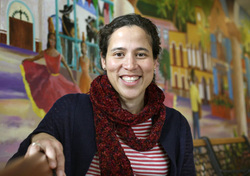
New Centro Hispano leader sees power in immigrant stories
October 27, 2013 6:05 am • DOUG ERICKSON | Wisconsin State Journal | [email protected] | 608-252-6149
Karen Menendez Coller’s academic passion kicked in as a high school student, propelling her eventually to a doctoral degree in public health from Johns Hopkins University in Baltimore.
It was all a part of having arrived in Los Angeles at age 14, a member of an immigrant family from war-torn El Salvador.
“There’s a drive that happens when you see your parents trying so hard,” said Coller, 38, the new executive director of Centro Hispano of Dane County. “I wouldn’t say it was expected of me to succeed. I wanted to succeed.”
Stories of immigrant families are powerful and need to be shared, she said, something she hopes to encourage in her new position.
“U.S.-born generations here sometimes forget that history, and that history is important. You should expect to succeed, not just exist,” Coller said, referring to the children of immigrants. “You should expect that your time here is meaningful, especially because it’s been the result of people fighting for a better life in our countries of origin.”
Centro Hispano, 810 W. Badger Road, is a nonprofit organization that provides social services, job training, educational opportunities and a cultural home to Latinos and other immigrant populations. Coller, who began Aug. 26, is the eighth executive director in the agency’s 30-year history. She succeeds Kent Craig, who left earlier this year to return to school after more than two years leading the organization.
Coller, most recently a faculty member at UCLA, already was planning to move to Madison from L.A. when she learned of the opening at Centro Hispano. Her husband — Dr. Ryan Coller, a pediatrician and Green Bay native — had taken a position at American Family Children’s Hospital. Coller herself was preparing to accept a job offer in public health at UW Hospital, she said.
The Centro Hispano job tugged at her because of the potential to quickly and positively affect people’s lives, she said. She had spent years leading research projects and developing programs addressing things such as unintended pregnancy in the Latino community and teen mental health problems. It was satisfying and important work, she said, but the slow pace of academia sometimes wore on her.
“I wasn’t seeing the impact right away, and it was kind of frustrating,” she said.
Gloria Reyes, a Madison police detective and president of the Centro Hispano board, said Coller impressed the hiring committee with the depth of her knowledge of Latino issues. “Now she’ll be bringing what she learned from her research and turning it into reality,” Reyes said.
One immediate goal for Coller is to strengthen current programs by reducing staff turnover, she said. The agency has an annual budget of $1.4 million and employs 19 people, 15 of them full time.
Longer term, Coller hopes to increase partnerships with other community groups and do more outreach to newly arrived immigrants.
“I’d like families to come here when they first arrive so that we can help stabilize them right away, instead of waiting for a crisis,” she said.
That approach — building strong relationships prior to an emergency — already works well with Centro’s youth programs, Coller said.
Coller’s family immigrated to the U.S. legally at a time when El Salvador was in the midst of a brutal civil war.
“Everybody was affected,” she said. “It was the norm to go to sleep and hear bombs going off in the distance. There were rifles in the streets, and you would get stopped at random checkpoints and have to bribe people to get through.”
Her father, an attorney, had difficulty finding work here and returned to El Salvador for several years while the rest of the family stayed in L.A., a heart-wrenching but familiar sacrifice to many immigrant families, Coller said.
Yet because of California’s large immigrant population, Coller said the adjustment for her was not difficult.
“L.A. is a very special place for immigrants, so I felt at home right away,” she said. “Everyone was extremely welcoming. I think immigrant families here in the Midwest feel a little bit more closed off.”
She earned a bachelor’s degree in cell biology at the University of California, Berkeley, then spent a year in Zambia at an HIV counseling and testing site. She returned to the U.S. to earn a master’s degree at the University of Michigan and a Ph.D. at Johns Hopkins, both in public health.
She met her husband while at Johns Hopkins. They live in Middleton and have one daughter, Olivia, almost 2.
Most recently, while on the faculty at UCLA, Coller studied high-achieving schools in L.A. to better understand the environments that lead Latino youths to make good life choices. She already met with Jennifer Cheatham, Madison’s new schools superintendent, to discuss how Centro Hispano’s programs fit with Cheatham’s strategic plan.
“We need strong leaders in the Latino community, and I think she brings that to us,” Reyes said of Coller. “I think she has the skills to take Centro Hispano to the next level.”
October 27, 2013 6:05 am • DOUG ERICKSON | Wisconsin State Journal | [email protected] | 608-252-6149
Karen Menendez Coller’s academic passion kicked in as a high school student, propelling her eventually to a doctoral degree in public health from Johns Hopkins University in Baltimore.
It was all a part of having arrived in Los Angeles at age 14, a member of an immigrant family from war-torn El Salvador.
“There’s a drive that happens when you see your parents trying so hard,” said Coller, 38, the new executive director of Centro Hispano of Dane County. “I wouldn’t say it was expected of me to succeed. I wanted to succeed.”
Stories of immigrant families are powerful and need to be shared, she said, something she hopes to encourage in her new position.
“U.S.-born generations here sometimes forget that history, and that history is important. You should expect to succeed, not just exist,” Coller said, referring to the children of immigrants. “You should expect that your time here is meaningful, especially because it’s been the result of people fighting for a better life in our countries of origin.”
Centro Hispano, 810 W. Badger Road, is a nonprofit organization that provides social services, job training, educational opportunities and a cultural home to Latinos and other immigrant populations. Coller, who began Aug. 26, is the eighth executive director in the agency’s 30-year history. She succeeds Kent Craig, who left earlier this year to return to school after more than two years leading the organization.
Coller, most recently a faculty member at UCLA, already was planning to move to Madison from L.A. when she learned of the opening at Centro Hispano. Her husband — Dr. Ryan Coller, a pediatrician and Green Bay native — had taken a position at American Family Children’s Hospital. Coller herself was preparing to accept a job offer in public health at UW Hospital, she said.
The Centro Hispano job tugged at her because of the potential to quickly and positively affect people’s lives, she said. She had spent years leading research projects and developing programs addressing things such as unintended pregnancy in the Latino community and teen mental health problems. It was satisfying and important work, she said, but the slow pace of academia sometimes wore on her.
“I wasn’t seeing the impact right away, and it was kind of frustrating,” she said.
Gloria Reyes, a Madison police detective and president of the Centro Hispano board, said Coller impressed the hiring committee with the depth of her knowledge of Latino issues. “Now she’ll be bringing what she learned from her research and turning it into reality,” Reyes said.
One immediate goal for Coller is to strengthen current programs by reducing staff turnover, she said. The agency has an annual budget of $1.4 million and employs 19 people, 15 of them full time.
Longer term, Coller hopes to increase partnerships with other community groups and do more outreach to newly arrived immigrants.
“I’d like families to come here when they first arrive so that we can help stabilize them right away, instead of waiting for a crisis,” she said.
That approach — building strong relationships prior to an emergency — already works well with Centro’s youth programs, Coller said.
Coller’s family immigrated to the U.S. legally at a time when El Salvador was in the midst of a brutal civil war.
“Everybody was affected,” she said. “It was the norm to go to sleep and hear bombs going off in the distance. There were rifles in the streets, and you would get stopped at random checkpoints and have to bribe people to get through.”
Her father, an attorney, had difficulty finding work here and returned to El Salvador for several years while the rest of the family stayed in L.A., a heart-wrenching but familiar sacrifice to many immigrant families, Coller said.
Yet because of California’s large immigrant population, Coller said the adjustment for her was not difficult.
“L.A. is a very special place for immigrants, so I felt at home right away,” she said. “Everyone was extremely welcoming. I think immigrant families here in the Midwest feel a little bit more closed off.”
She earned a bachelor’s degree in cell biology at the University of California, Berkeley, then spent a year in Zambia at an HIV counseling and testing site. She returned to the U.S. to earn a master’s degree at the University of Michigan and a Ph.D. at Johns Hopkins, both in public health.
She met her husband while at Johns Hopkins. They live in Middleton and have one daughter, Olivia, almost 2.
Most recently, while on the faculty at UCLA, Coller studied high-achieving schools in L.A. to better understand the environments that lead Latino youths to make good life choices. She already met with Jennifer Cheatham, Madison’s new schools superintendent, to discuss how Centro Hispano’s programs fit with Cheatham’s strategic plan.
“We need strong leaders in the Latino community, and I think she brings that to us,” Reyes said of Coller. “I think she has the skills to take Centro Hispano to the next level.”

